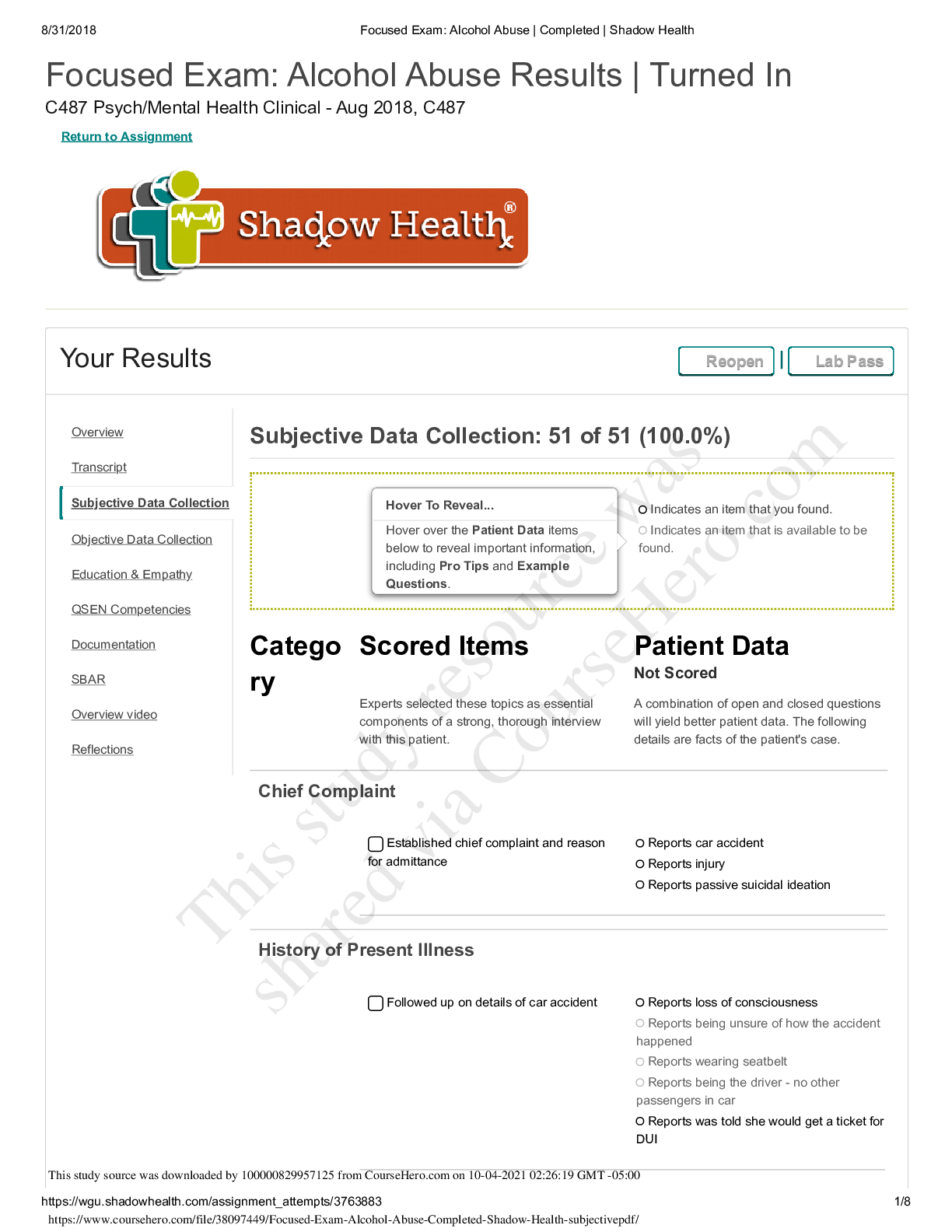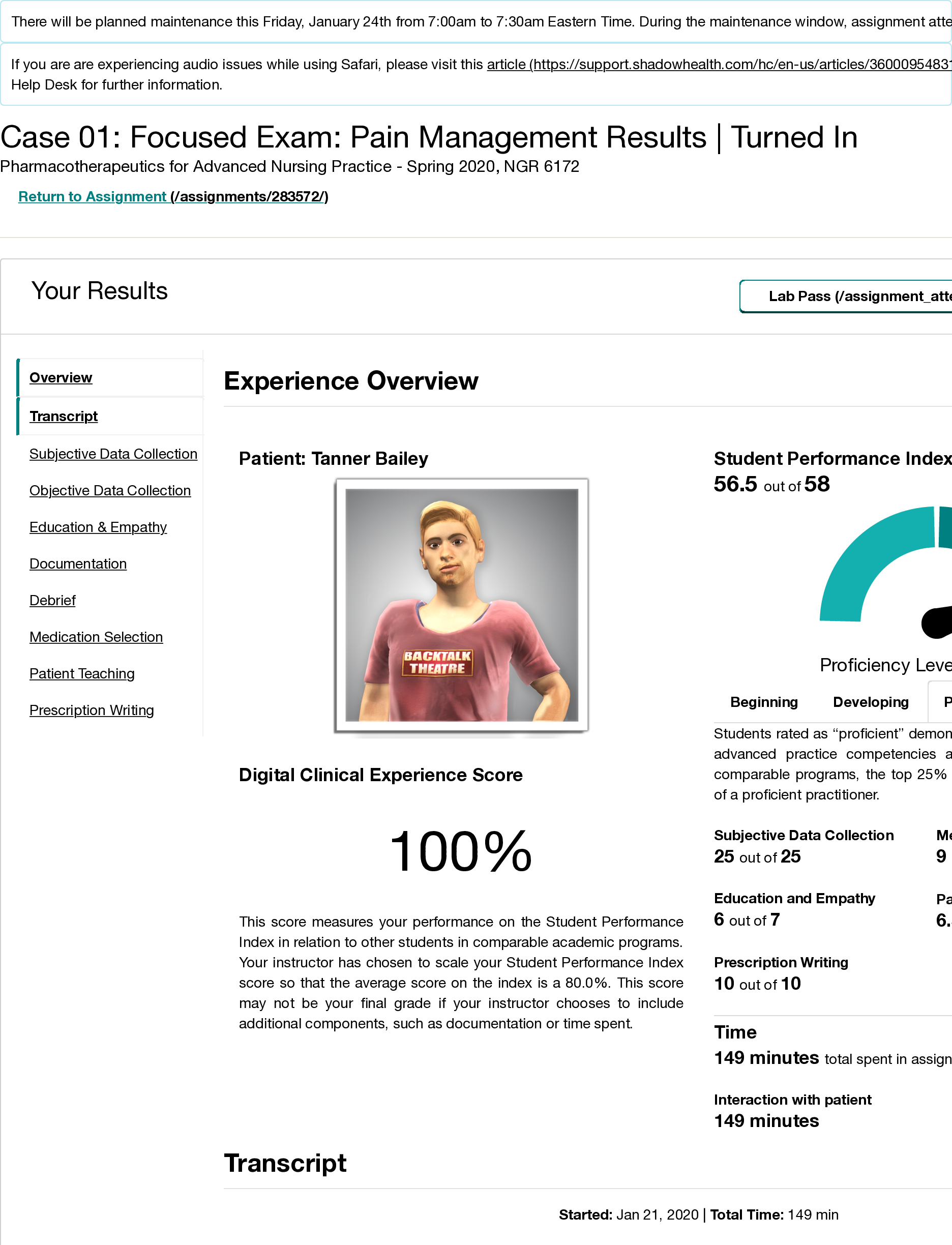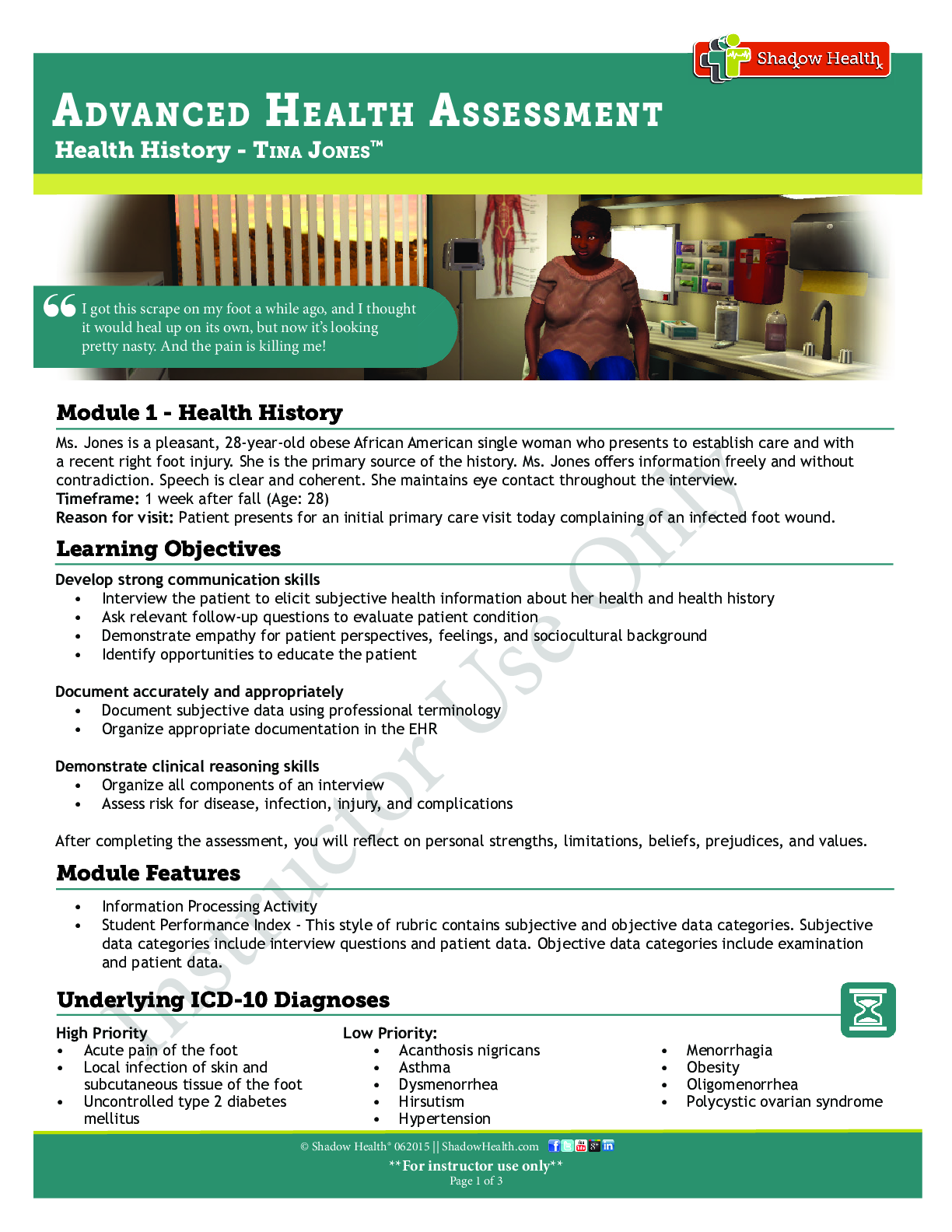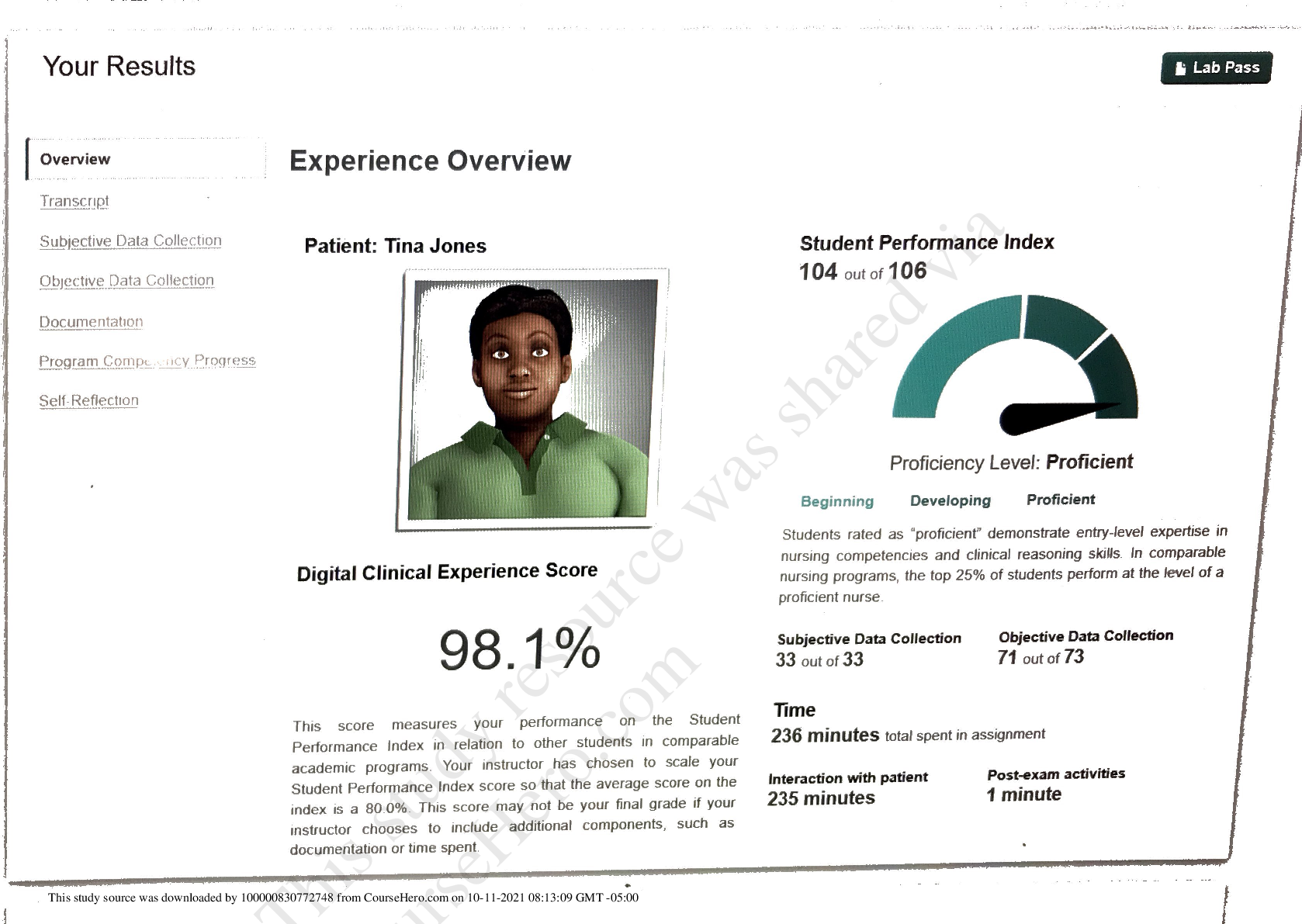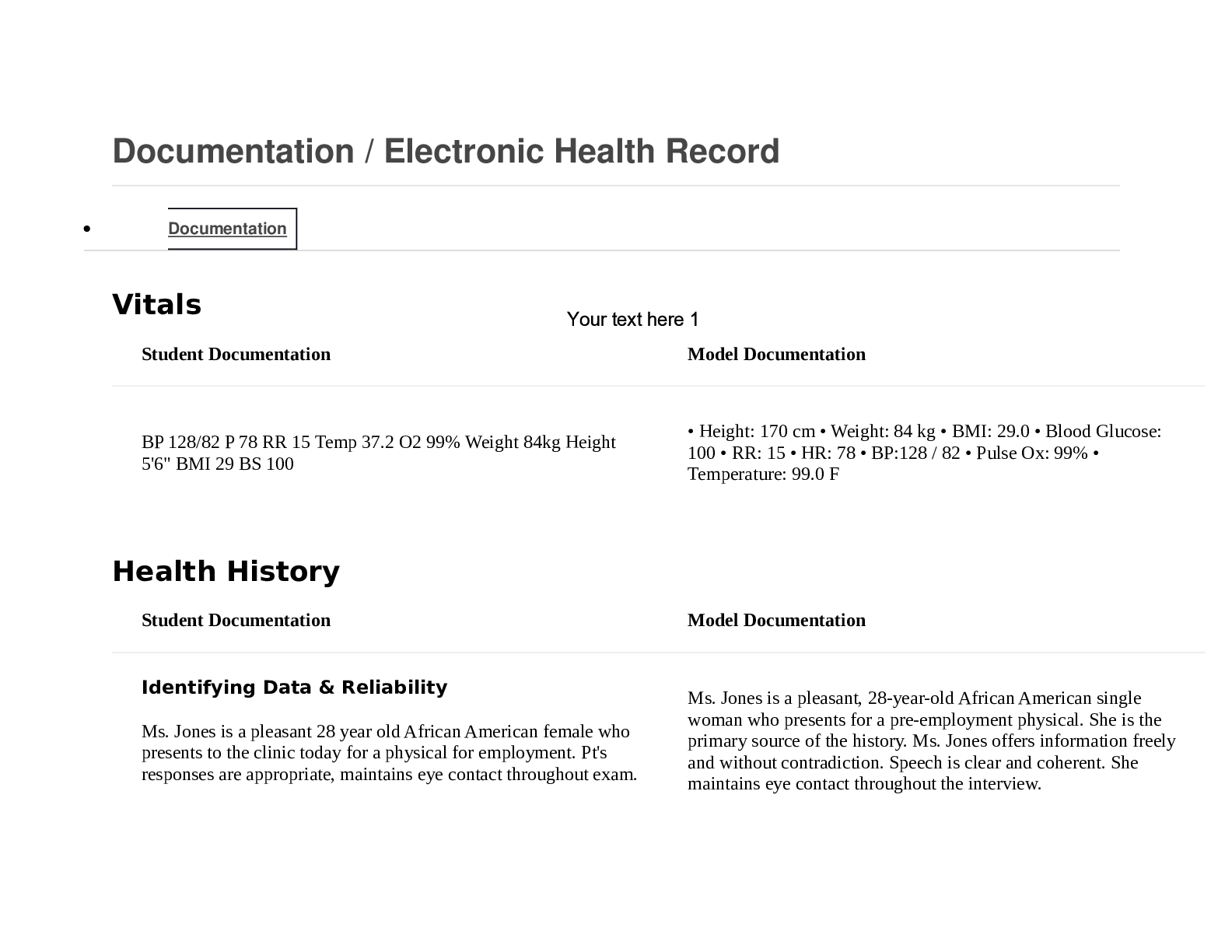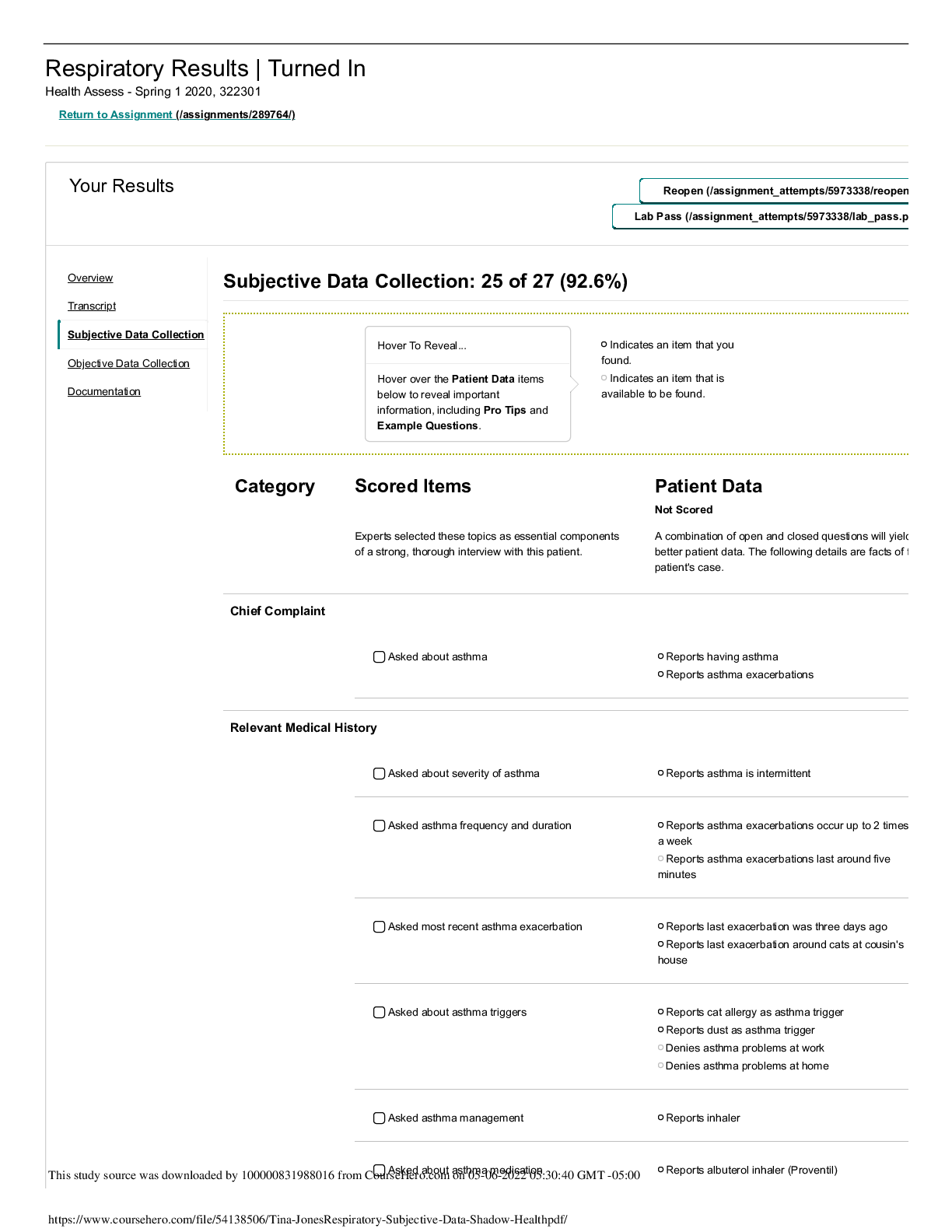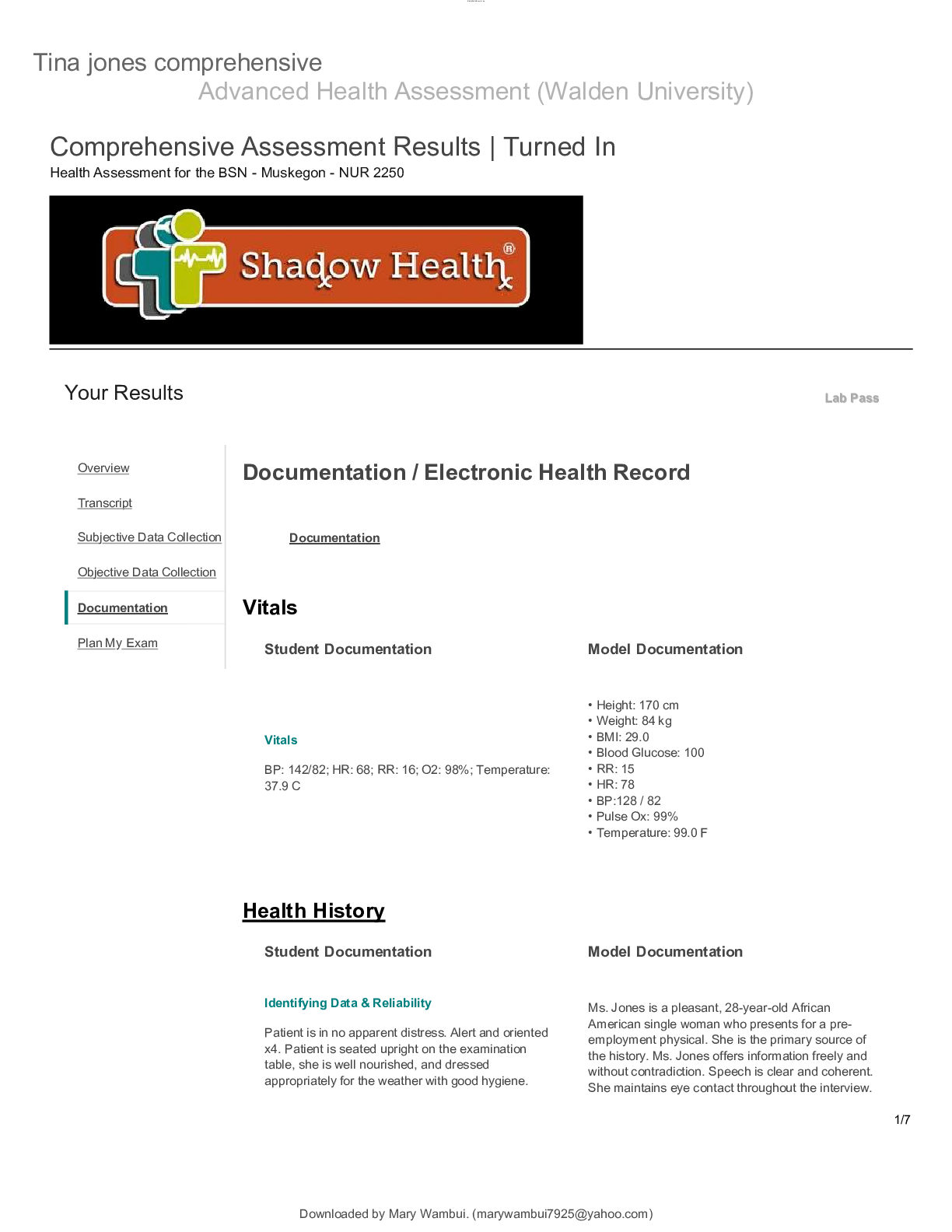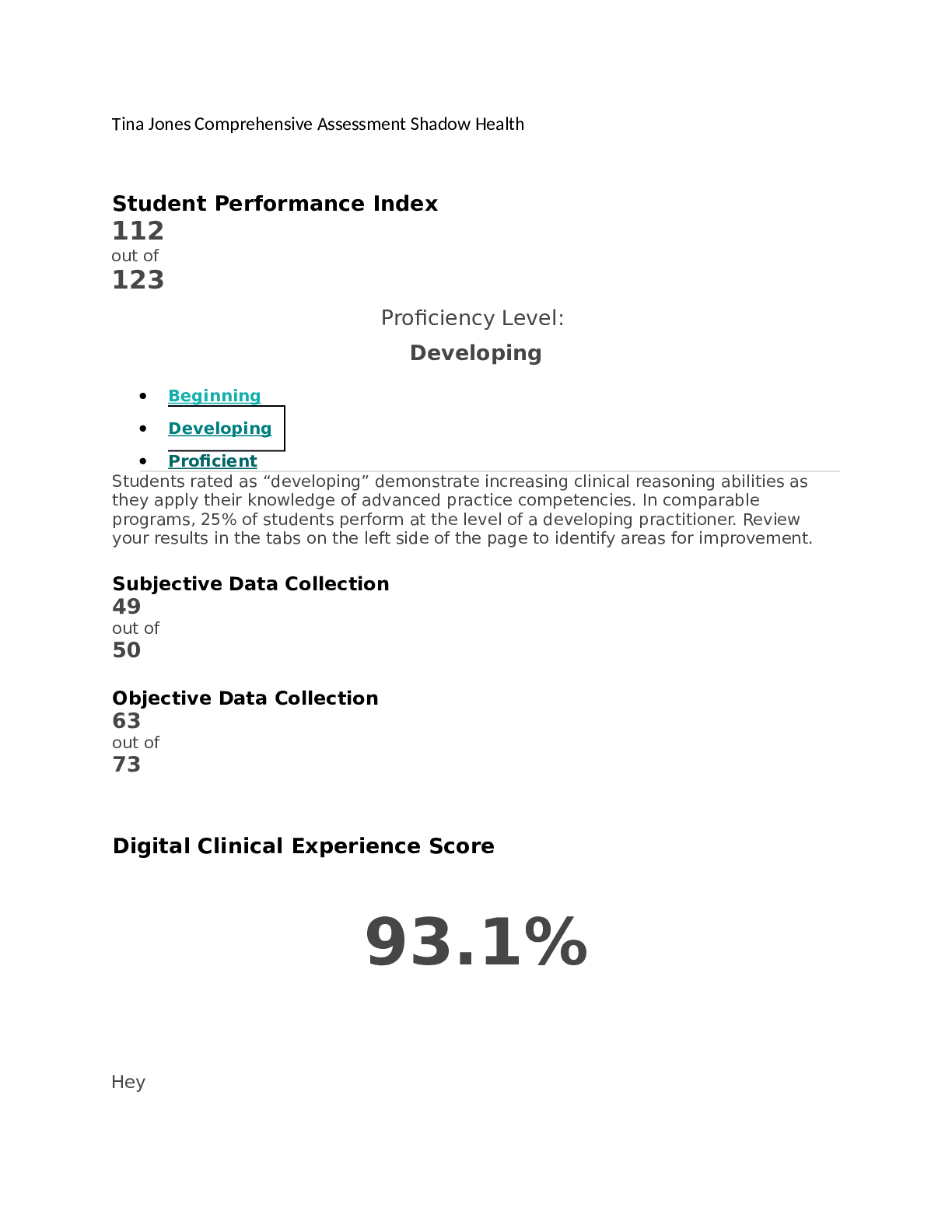*NURSING > SHADOW HEALTH > SHADOW HEALTH Focused Exam ERICK FORD Schizophrenia. [GRADED] (All)
SHADOW HEALTH Focused Exam ERICK FORD Schizophrenia. [GRADED]
Document Content and Description Below
Eric Ford- Schizophrenia Chief Complaint Finding: Established chief complaint Finding: Reports hallucinations (Found) Pro Tip: A patient's chief complaint establishes any illn... esses or concerns they are presenting. Asking about the chief complaint will allow the patient to voice any concerns or symptoms the patient may have. Example Question: Do you ever hear things that others do not hear? Finding: Has paranoid thoughts (Found) Pro Tip: A patient's chief complaint establishes any illnesses or concerns they are presenting. Asking about the chief complaint will allow the patient to voice any concerns or symptoms the patient may have. Example Question: Do you ever think people are trying to harm you? History of Present Illness Finding: Asked about onset and duration of symptoms Finding: Reports hearing voices for the past 7 days (Found) Pro Tip: Asking a patient about the length of their current health issues solicits information relevant to the history of their present illness. Details of their current complaint will help you follow-up on any present conditions or symptoms, such as the location of their pain or the amount of pain they may be experiencing. Example Question: When did your symptoms start? Finding: Reports voices have increased over the last week (Found) Pro Tip: Asking a patient about the length of their current health issues solicits information relevant to the history of their present illness. Details of their current complaint will help you follow-up on any present conditions or symptoms, such as the location of their pain or the amount of pain they may be experiencing. Example Question: Did the hallucinations start gradually? Finding: Reports that voices are currently constant (Available) Pro Tip: Asking a patient about the length of their current health issues solicits information relevant to the history of their present illness. Details of their current complaint will help you follow-up on any present conditions or symptoms, such as the location of their pain or the amount of pain they may be experiencing. Example Question: Are your hallucinations constant? Finding: Asked about characteristics of symptoms Finding: Describes voices as sometimes male, sometimes female (Found) Pro Tip: Asking a patient about the length of their current health issues solicits information relevant to the history of their present illness. Details of their current complaint will help you follow-up on any present conditions or symptoms, such as the location of their pain or the amount of pain they may be experiencing. Example Question: Can you describe your hallucinations? Finding: Denies visual hallucinations (Found) Pro Tip: Asking a patient about the length of their current health issues solicits information relevant to the history of their present illness. Details of their current complaint will help you follow-up on any present conditions or symptoms, such as the location of their pain or the amount of pain they may be experiencing. Example Question: Do you ever see things that are not there? Finding: Denies gustatory hallucinations (Available) Pro Tip: Asking a patient about the length of their current health issues solicits information relevant to the history of their present illness. Details of their current complaint will help you follow-up on any present conditions or symptoms, such as the location of their pain or the amount of pain they may be experiencing. Example Question: Do you taste things that are not there? Finding: Denies olfactory hallucinations (Found) Pro Tip: Asking a patient about the length of their current health issues solicits information relevant to the history of their present illness. Details of their current complaint will help you follow-up on any present conditions or symptoms, such as the location of their pain or the amount of pain they may be experiencing. Example Question: Do you smell things that are not there? Finding: Denies tactile hallucinations (Available) Pro Tip: Asking a patient about the length of their current health issues solicits information relevant to the history of their present illness. Details of their current complaint will help you follow-up on any present conditions or symptoms, such as the location of their pain or the amount of pain they may be experiencing. Example Question: Do you feel things that are not there? Finding: Followed up on content of hallucinations Finding: Reports command hallucinations (Found) Pro Tip: Asking a patient about the length of their current health issues solicits information relevant to the history of their present illness. Details of their current complaint will help you follow-up on any present conditions or symptoms, such as the location of their pain or the amount of pain they may be experiencing. Example Question: Do the voices tell you to do anything? Finding: Reports resisting doing what the voice say (Available) Pro Tip: Asking a patient about the length of their current health issues solicits information relevant to the history of their present illness. Details of their current complaint will help you follow-up on any present conditions or symptoms, such as the location of their pain or the amount of pain they may be experiencing. Example Question: Do you do what the voices say? Finding: Asked about aggravating factors of symptoms Finding: Reports that voices are more disturbing in quiet environments (when unable to be distracted) (Found) Pro Tip: Asking a patient about the length of their current health issues solicits information relevant to the history of their present illness. Details of their current complaint will help you follow-up on any present conditions or symptoms, such as the location of their pain or the amount of pain they may be experiencing. Example Question: What makes your symptoms worse? Finding: Asked about coping strategies Finding: Reports music as a coping strategy (Found) Pro Tip: Asking a patient about the length of their current health issues solicits information relevant to the history of their present illness. Details of their current complaint will help you follow-up on any present conditions or symptoms, such as the location of their pain or the amount of pain they may be experiencing. Example Question: How do you cope with your hallucinations? Past Medical History Finding: Asked about existing health conditions Finding: Denies general health conditions (Found) Pro Tip: Inquiring into the patient's relevant history can reveal past diagnoses and previous conditions or concerns. Information about the patient's existing health conditions, a timeline of diagnosis, symptoms, and allergies can indicate where you should follow-up for further care and treatment. Example Question: What health issues do you have? Finding: Asked about history of mental health Finding: Reports diagnosis of schizophrenia (Found) Pro Tip: Inquiring into the patient's relevant history can reveal past diagnoses and previous conditions or concerns. Information about the patient's existing health conditions, a timeline of diagnosis, symptoms, and allergies can indicate where you should follow-up for further care and treatment. Example Question: Have you been diagnosed with schizophrenia? Finding: Reports occasional insomnia (Found) Pro Tip: Inquiring into the patient's relevant history can reveal past diagnoses and previous conditions or concerns. Information about the patient's existing health conditions, a timeline of diagnosis, symptoms, and allergies can indicate where you should follow-up for further care and treatment. Example Question: Do you have insomnia? Finding: Denies past history of depression (Available) Pro Tip: Inquiring into the patient's relevant history can reveal past diagnoses and previous conditions or concerns. Information about the patient's existing health conditions, a timeline of diagnosis, symptoms, and allergies can indicate where you should follow-up for further care and treatment. Example Question: Do you have a history of depression? Finding: Denies past history of anxiety (Found) Pro Tip: Inquiring into the patient's relevant history can reveal past diagnoses and previous conditions or concerns. Information about the patient's existing health conditions, a timeline of diagnosis, symptoms, and allergies can indicate where you should follow-up for further care and treatment. Example Question: Do you have generalized anxiety disorder? Finding: Denies past history of bipolar disorder (Available) Pro Tip: Inquiring into the patient's relevant history can reveal past diagnoses and previous conditions or concerns. Information about the patient's existing health conditions, a timeline of diagnosis, symptoms, and allergies can indicate where you should follow-up for further care and treatment. Example Question: Have you been diagnosed with bipolar disorder? Finding: Followed up on schizophrenia diagnosis Finding: Diagnosed age 23 (Found) Pro Tip: Inquiring into the patient's relevant history can reveal past diagnoses and previous conditions or concerns. Information about the patient's existing health conditions, a timeline of diagnosis, symptoms, and allergies can indicate where you should follow-up for further care and treatment. Example Question: At what age did you get schizophrenia? Finding: Followed up on insomnia Finding: Reports frequent insomnia (Available) Pro Tip: Inquiring into the patient's relevant history can reveal past diagnoses and previous conditions or concerns. Information about the patient's existing health conditions, a timeline of diagnosis, symptoms, and allergies can indicate where you should follow-up for further care and treatment. Example Question: How often have you had trouble falling asleep? Finding: Reports difficulty falling asleep (Available) Pro Tip: Inquiring into the patient's relevant history can reveal past diagnoses and previous conditions or concerns. Information about the patient's existing health conditions, a timeline of diagnosis, symptoms, and allergies can indicate where you should follow-up for further care and treatment. Example Question: Have you had trouble falling asleep before? Finding: Reports recent insomnia has increased (Available) Pro Tip: Inquiring into the patient's relevant history can reveal past diagnoses and previous conditions or concerns. Information about the patient's existing health conditions, a timeline of diagnosis, symptoms, and allergies can indicate where you should follow-up for further care and treatment. Example Question: Can you tell me more about your sleep? Finding: Reports sleeping 2 - 3 hours per night (Available) Pro Tip: Inquiring into the patient's relevant history can reveal past diagnoses and previous conditions or concerns. Information about the patient's existing health conditions, a timeline of diagnosis, symptoms, and allergies can indicate where you should follow-up for further care and treatment. Example Question: How many hours a night do you sleep? Finding: Reports frequent awakening (Available) Pro Tip: Inquiring into the patient's relevant history can reveal past diagnoses and previous conditions or concerns. Information about the patient's existing health conditions, a timeline of diagnosis, symptoms, and allergies can indicate where you should follow-up for further care and treatment. Example Question: How often do you wake up during the night? Finding: Reports occasional nightmares (Available) Pro Tip: Inquiring into the patient's relevant history can reveal past diagnoses and previous conditions or concerns. Information about the patient's existing health conditions, a timeline of diagnosis, symptoms, and allergies can indicate where you should follow-up for further care and treatment. Example Question: Does anything make it harder to sleep? Finding: Asked about previous psychiatric hospitalizations Finding: Reports previous psychiatric hospitalizations (Found) Pro Tip: Inquiring into the patient's relevant history can reveal past diagnoses and previous conditions or concerns. Information about the patient's existing health conditions, a timeline of diagnosis, symptoms, and allergies can indicate where you should follow-up for further care and treatment. Example Question: Have you had to go to the hospital for a psychiatric disorder? Finding: Followed up on previous hospitalizations Finding: Reports 3 previous hospitalizations (Found) Pro Tip: Inquiring into the patient's relevant history can reveal past diagnoses and previous conditions or concerns. Information about the patient's existing health conditions, a timeline of diagnosis, symptoms, and allergies can indicate where you should follow-up for further care and treatment. Example Question: Have you been hospitalized as an adult Finding: All 3 hospitalizations were psychiatric admissions (Found) Pro Tip: Inquiring into the patient's relevant history can reveal past diagnoses and previous conditions or concerns. Information about the patient's existing health conditions, a timeline of diagnosis, symptoms, and allergies can indicate where you should follow-up for further care and treatment. Example Question: Why were you previously admitted to the hospital? Finding: Reports first hospitalization was age 23 (Available) Pro Tip: Inquiring into the patient's relevant history can reveal past diagnoses and previous conditions or concerns. Information about the patient's existing health conditions, a timeline of diagnosis, symptoms, and allergies can indicate where you should follow-up for further care and treatment. Example Question: Can you tell me about your history of psychiatric treatment? Finding: Reports second hospitalization was age 25 (Available) Pro Tip: Inquiring into the patient's relevant history can reveal past diagnoses and previous conditions or concerns. Information about the patient's existing health conditions, a timeline of diagnosis, symptoms, and allergies can indicate where you should follow-up for further care and treatment. Example Question: Can you tell me about your history of psychiatric treatment? Finding: Reports third hospitalization was age 26 (Available) Pro Tip: Inquiring into the patient's relevant history can reveal past diagnoses and previous conditions or concerns. Information about the patient's existing health conditions, a timeline of diagnosis, symptoms, and allergies can indicate where you should follow-up for further care and treatment. Example Question: Can you tell me about your history of psychiatric treatment? Finding: Asked about suicidal ideation and self-harm Finding: Reports command hallucinations telling him to take a bottle of pills (Available) Pro Tip: Inquiring into the patient's relevant history can reveal past diagnoses and previous conditions or concerns. Information about the patient's existing health conditions, a timeline of diagnosis, symptoms, and allergies can indicate where you should follow-up for further care and treatment. Example Question: Can you tell me what the voices command you to do? Finding: Asked about past suicide attempts Finding: Reports one past suicide attempt (Found) Pro Tip: Inquiring into the patient's relevant history can reveal past diagnoses and previous conditions or concerns. Information about the patient's existing health conditions, a timeline of diagnosis, symptoms, and allergies can indicate where you should follow-up for further care and treatment. Example Question: Have you ever attempted suicide? Finding: Followed up on suicide planning Finding: Denies intent to act on the command (Found) Pro Tip: Inquiring into the patient's relevant history can reveal past diagnoses and previous conditions or concerns. Information about the patient's existing health conditions, a timeline of diagnosis, symptoms, and allergies can indicate where you should follow-up for further care and treatment. Example Question: Have you ever wished that you were dead? Finding: Asked about homicidal ideation Finding: Denies homicidal ideation (Found) Pro Tip: Inquiring into the patient's relevant history can reveal past diagnoses and previous conditions or concerns. Information about the patient's existing health conditions, a timeline of diagnosis, symptoms, and allergies can indicate where you should follow-up for further care and treatment. Example Question: Have the voices ever told you to hurt someone? Home Medications Finding: Asked about home medications and treatment of symptoms Finding: Reports that he typically takes a prescribed medication for diagnosed schizophrenia (Found) Pro Tip: A patient's home medications can provide insight into the patient's current treatment and its effacacy. Inquiring into medication history, dosage, and frequency will help you understand the patient's background and how it may affect their current situation. Example Question: Are you on any prescription medication? Finding: Reports medication for insomnia (Found) Pro Tip: A patient's home medications can provide insight into the patient's current treatment and its effacacy. Inquiring into medication history, dosage, and frequency will help you understand the patient's background and how it may affect their current situation. Example Question: Are you on any prescription medication? Finding: Denies OTC medications (Available) Pro Tip: A patient's home medications can provide insight into the patient's current treatment and its effacacy. Inquiring into medication history, dosage, and frequency will help you understand the patient's background and how it may affect their current situation. Example Question: Do you take a medication you can buy at the store? Finding: Denies supplements or herbal formulas (Available) Pro Tip: A patient's home medications can provide insight into the patient's current treatment and its effacacy. Inquiring into medication history, dosage, and frequency will help you understand the patient's background and how it may affect their current situation. Example Question: Do you take supplements? Finding: Denies vitamins (Available) Pro Tip: A patient's home medications can provide insight into the patient's current treatment and its effacacy. Inquiring into medication history, dosage, and frequency will help you understand the patient's background and how it may affect their current situation. Example Question: Do you take vitamins? Finding: Asked about medication regimen adherence Finding: Reports missing doses of medication for schizophrenia (Found) Pro Tip: A patient's home medications can provide insight into the patient's current treatment and its effacacy. Inquiring into medication history, dosage, and frequency will help you understand the patient's background and how it may affect their current situation. Example Question: Do you miss doses of your medication? Finding: Reports being unsure of last dose of medication (Found) Pro Tip: A patient's home medications can provide insight into the patient's current treatment and its effacacy. Inquiring into medication history, dosage, and frequency will help you understand the patient's background and how it may affect their current situation. Example Question: When was the last time you took any medications? Finding: Reports that he was unable to continue take it because he tried to get it refilled, and insurance coverage wouldn't cover his usual prescription (Found) Pro Tip: A patient's home medications can provide insight into the patient's current treatment and its effacacy. Inquiring into medication history, dosage, and frequency will help you understand the patient's background and how it may affect their current situation. Example Question: Why have you been missing doses of your medication? Finding: Reports that his mother was trying to help him get his usual prescription covered (Found) Pro Tip: A patient's home medications can provide insight into the patient's current treatment and its effacacy. Inquiring into medication history, dosage, and frequency will help you understand the patient's background and how it may affect their current situation. Example Question: Do you have difficulty obtaining medication? Finding: Followed up on last dose of home medications Finding: Reports not remembering his last dose of medication (Found) Pro Tip: A patient's home medications can provide insight into the patient's current treatment and its effacacy. Inquiring into medication history, dosage, and frequency will help you understand the patient's background and how it may affect their current situation. Example Question: What medications have you taken recently? Finding: Followed up on medication for schizophrenia Finding: Medication name is Risperdal (Found) Pro Tip: A patient's home medications can provide insight into the patient's current treatment and its effacacy. Inquiring into medication history, dosage, and frequency will help you understand the patient's background and how it may affect their current situation. Example Question: What schizophrenia medication do you take? Finding: Denies remembering Risperdal dosage (Available) Pro Tip: A patient's home medications can provide insight into the patient's current treatment and its effacacy. Inquiring into medication history, dosage, and frequency will help you understand the patient's background and how it may affect their current situation. Example Question: Do you know what dosage you take of risperdal? Finding: Takes medication twice a day (Available) Pro Tip: A patient's home medications can provide insight into the patient's current treatment and its effacacy. Inquiring into medication history, dosage, and frequency will help you understand the patient's background and how it may affect their current situation. Example Question: How many times a day are you taking a dose of risperdal? Finding: Reports that medication typically is effective (Available) Pro Tip: A patient's home medications can provide insight into the patient's current treatment and its effacacy. Inquiring into medication history, dosage, and frequency will help you understand the patient's background and how it may affect their current situation. Example Question: Does the risperdal work? Finding: Followed up on medication for insomnia Finding: Medication name is trazodone (Found) Pro Tip: A patient's home medications can provide insight into the patient's current treatment and its effacacy. Inquiring into medication history, dosage, and frequency will help you understand the patient's background and how it may affect their current situation. Example Question: Have you been taking prescription sleep medication? Finding: Denies remembering trazodone dosage (Available) Pro Tip: A patient's home medications can provide insight into the patient's current treatment and its effacacy. Inquiring into medication history, dosage, and frequency will help you understand the patient's background and how it may affect their current situation. Example Question: How much is one dose of trazodone? Finding: Takes medication as prescribed once daily at HS (Found) Pro Tip: A patient's home medications can provide insight into the patient's current treatment and its effacacy. Inquiring into medication history, dosage, and frequency will help you understand the patient's background and how it may affect their current situation. Example Question: How many times a day are you taking a dose of trazodone? Finding: Reports that medication is typically effective when taken. (Available) Pro Tip: A patient's home medications can provide insight into the patient's current treatment and its effacacy. Inquiring into medication history, dosage, and frequency will help you understand the patient's background and how it may affect their current situation. Example Question: Why are you taking trazodone? Social History Finding: Asked about drug use Finding: Denies drug use (Found) Pro Tip: A patient's social history encompasses their family and support system, living situation, and daily behaviors such as diet, exercise, sexual activity, and substance use. These factors can influence their current health and wellness. Asking about a patient's social history can also unveil the influence of their present illnesses in their social lives. Example Question: Do you use drugs now? Finding: Asked about alcohol use Finding: Reports some alcohol use (Found) Pro Tip: A patient's social history encompasses their family and support system, living situation, and daily behaviors such as diet, exercise, sexual activity, and substance use. These factors can influence their current health and wellness. Asking about a patient's social history can also unveil the influence of their present illnesses in their social lives. Example Question: Do you drink alcohol? Finding: Followed up on alcohol use Finding: Denies current alcohol in system (Available) Pro Tip: A patient's social history encompasses their family and support system, living situation, and daily behaviors such as diet, exercise, sexual activity, and substance use. These factors can influence their current health and wellness. Asking about a patient's social history can also unveil the influence of their present illnesses in their social lives. Example Question: Do you have alcohol in your system? Finding: Reports drinking 0 - 2 beers a week (Available) Pro Tip: A patient's social history encompasses their family and support system, living situation, and daily behaviors such as diet, exercise, sexual activity, and substance use. These factors can influence their current health and wellness. Asking about a patient's social history can also unveil the influence of their present illnesses in their social lives. Example Question: How much alcohol do you usually drink in one sitting? Finding: Denies binge drinking (Available) Pro Tip: A patient's social history encompasses their family and support system, living situation, and daily behaviors such as diet, exercise, sexual activity, and substance use. These factors can influence their current health and wellness. Asking about a patient's social history can also unveil the influence of their present illnesses in their social lives. Example Question: Do you binge drink? Finding: Asked about tobacco and nicotine use Finding: Reports smoking cigarettes (Found) Pro Tip: A patient's social history encompasses their family and support system, living situation, and daily behaviors such as diet, exercise, sexual activity, and substance use. These factors can influence their current health and wellness. Asking about a patient's social history can also unveil the influence of their present illnesses in their social lives. Example Question: Do you use tobacco? Finding: Followed up on tobacco and nicotine use Finding: Reports smoking 1 PPD (Found) Pro Tip: A patient's social history encompasses their family and support system, living situation, and daily behaviors such as diet, exercise, sexual activity, and substance use. These factors can influence their current health and wellness. Asking about a patient's social history can also unveil the influence of their present illnesses in their social lives. Example Question: How much do you smoke? Finding: Reports smoking since age 16 (Found) Pro Tip: A patient's social history encompasses their family and support system, living situation, and daily behaviors such as diet, exercise, sexual activity, and substance use. These factors can influence their current health and wellness. Asking about a patient's social history can also unveil the influence of their present illnesses in their social lives. Example Question: When did you first try smoking? Finding: Denies interest in quitting smoking (Available) Pro Tip: A patient's social history encompasses their family and support system, living situation, and daily behaviors such as diet, exercise, sexual activity, and substance use. These factors can influence their current health and wellness. Asking about a patient's social history can also unveil the influence of their present illnesses in their social lives. Example Question: Do you plan to quit smoking? Finding: Asked about occupation and education Finding: Reports currently working in a grocery store (Found) Pro Tip: A patient's social history encompasses their family and support system, living situation, and daily behaviors such as diet, exercise, sexual activity, and substance use. These factors can influence their current health and wellness. Asking about a patient's social history can also unveil the influence of their present illnesses in their social lives. Example Question: Do you have a job? Finding: Reports working 20 - 30 hours / week (Available) Pro Tip: A patient's social history encompasses their family and support system, living situation, and daily behaviors such as diet, exercise, sexual activity, and substance use. These factors can influence their current health and wellness. Asking about a patient's social history can also unveil the influence of their present illnesses in their social lives. Example Question: Is your job full time? Finding: Reports some college (Found) Pro Tip: A patient's social history encompasses their family and support system, living situation, and daily behaviors such as diet, exercise, sexual activity, and substance use. These factors can influence their current health and wellness. Asking about a patient's social history can also unveil the influence of their present illnesses in their social lives. Example Question: Are you in school? Finding: Currently in college working toward Audio Engineer degree (Found) Pro Tip: A patient's social history encompasses their family and support system, living situation, and daily behaviors such as diet, exercise, sexual activity, and substance use. These factors can influence their current health and wellness. Asking about a patient's social history can also unveil the influence of their present illnesses in their social lives. Example Question: What degree are you seeking at school? Finding: Asked about living situation, safety, and support system Finding: Lives with mother (Available) Pro Tip: A patient's social history encompasses their family and support system, living situation, and daily behaviors such as diet, exercise, sexual activity, and substance use. These factors can influence their current health and wellness. Asking about a patient's social history can also unveil the influence of their present illnesses in their social lives. Example Question: Who do you live with? Finding: Has no children (Available) Pro Tip: A patient's social history encompasses their family and support system, living situation, and daily behaviors such as diet, exercise, sexual activity, and substance use. These factors can influence their current health and wellness. Asking about a patient's social history can also unveil the influence of their present illnesses in their social lives. Example Question: Do you have children? Finding: Never married, in a relationship (Available) Pro Tip: A patient's social history encompasses their family and support system, living situation, and daily behaviors such as diet, exercise, sexual activity, and substance use. These factors can influence their current health and wellness. Asking about a patient's social history can also unveil the influence of their present illnesses in their social lives. Example Question: Are you married? Finding: Reports not feeling safe at home (Found) Pro Tip: A patient's social history encompasses their family and support system, living situation, and daily behaviors such as diet, exercise, sexual activity, and substance use. These factors can influence their current health and wellness. Asking about a patient's social history can also unveil the influence of their present illnesses in their social lives. Example Question: Do you feel safe at home? Finding: Asked about activities of daily living Finding: Reports not bathing in the last week (Available) Pro Tip: A patient's social history encompasses their family and support system, living situation, and daily behaviors such as diet, exercise, sexual activity, and substance use. These factors can influence their current health and wellness. Asking about a patient's social history can also unveil the influence of their present illnesses in their social lives. Example Question: How often do you bathe? Finding: Reports not changing clothes in the last week (Available) Pro Tip: A patient's social history encompasses their family and support system, living situation, and daily behaviors such as diet, exercise, sexual activity, and substance use. These factors can influence their current health and wellness. Asking about a patient's social history can also unveil the influence of their present illnesses in their social lives. Example Question: When the last time I changed clothes was? Finding: Reports not being able to work in the last week (Available) Pro Tip: A patient's social history encompasses their family and support system, living situation, and daily behaviors such as diet, exercise, sexual activity, and substance use. These factors can influence their current health and wellness. Asking about a patient's social history can also unveil the influence of their present illnesses in their social lives. Example Question: How often do you miss work? Finding: Reports not being able to go to school in the last week (Available) Pro Tip: A patient's social history encompasses their family and support system, living situation, and daily behaviors such as diet, exercise, sexual activity, and substance use. These factors can influence their current health and wellness. Asking about a patient's social history can also unveil the influence of their present illnesses in their social lives. Example Question: How often do you miss school? Finding: Asked about appetite Finding: Reports loss of appetite (Found) Pro Tip: A patient's social history encompasses their family and support system, living situation, and daily behaviors such as diet, exercise, sexual activity, and substance use. These factors can influence their current health and wellness. Asking about a patient's social history can also unveil the influence of their present illnesses in their social lives. Example Question: How is your appetite? Finding: Reports unable to finish a meal (Found) Pro Tip: A patient's social history encompasses their family and support system, living situation, and daily behaviors such as diet, exercise, sexual activity, and substance use. These factors can influence their current health and wellness. Asking about a patient's social history can also unveil the influence of their present illnesses in their social lives. Example Question: Has your appetite changed? Finding: Reports skipping meals (Available) Pro Tip: A patient's social history encompasses their family and support system, living situation, and daily behaviors such as diet, exercise, sexual activity, and substance use. These factors can influence their current health and wellness. Asking about a patient's social history can also unveil the influence of their present illnesses in their social lives. Example Question: Do you often skip meals? Finding: Reports loss of appetite has gone on for the past week (Available) Pro Tip: A patient's social history encompasses their family and support system, living situation, and daily behaviors such as diet, exercise, sexual activity, and substance use. These factors can influence their current health and wellness. Asking about a patient's social history can also unveil the influence of their present illnesses in their social lives. Example Question: How often did you have no appetite? Finding: Reports not knowing when or what his last meal was (Available) Pro Tip: A patient's social history encompasses their family and support system, living situation, and daily behaviors such as diet, exercise, sexual activity, and substance use. These factors can influence their current health and wellness. Asking about a patient's social history can also unveil the influence of their present illnesses in their social lives. Example Question: When was your last meal? Review of Systems Finding: Asked about general symptoms Finding: Denies fever (Available) Pro Tip: Understanding a patient's health involves a comprehensive overview of their physiological systems. This is necessary to understand what symptoms may indicate larger issues, and what treatments the patient may require. Example Question: Do you have a fever? Finding: Denies chills (Available) Pro Tip: Understanding a patient's health involves a comprehensive overview of their physiological systems. This is necessary to understand what symptoms may indicate larger issues, and what treatments the patient may require. Example Question: Do you get chills? Finding: Denies night sweats (Available) Pro Tip: Understanding a patient's health involves a comprehensive overview of their physiological systems. This is necessary to understand what symptoms may indicate larger issues, and what treatments the patient may require. Example Question: Have you been having night sweats? Finding: Denies fatigue (Available) Pro Tip: Understanding a patient's health involves a comprehensive overview of their physiological systems. This is necessary to understand what symptoms may indicate larger issues, and what treatments the patient may require. Example Question: How often have you felt fatigued? Finding: Reports weight loss (Available) Pro Tip: Understanding a patient's health involves a comprehensive overview of their physiological systems. This is necessary to understand what symptoms may indicate larger issues, and what treatments the patient may require. Example Question: Have you lost weight? Finding: Asked about review of systems for respiratory Finding: Denies cough (Available) Pro Tip: Understanding a patient's health involves a comprehensive overview of their physiological systems. This is necessary to understand what symptoms may indicate larger issues, and what treatments the patient may require. Example Question: Do you have a cough? Finding: Denies shortness of breath (Found) Pro Tip: Understanding a patient's health involves a comprehensive overview of their physiological systems. This is necessary to understand what symptoms may indicate larger issues, and what treatments the patient may require. Example Question: Do you have respiratory problems? Finding: Denies dyspnea on exertion (Available) Pro Tip: Understanding a patient's health involves a comprehensive overview of their physiological systems. This is necessary to understand what symptoms may indicate larger issues, and what treatments the patient may require. Example Question: Do normal activities make you short of breath? Finding: Denies wheezing (Available) Pro Tip: Understanding a patient's health involves a comprehensive overview of their physiological systems. This is necessary to understand what symptoms may indicate larger issues, and what treatments the patient may require. Example Question: Are you wheezing? Finding: Asked about review of systems for gastrointestinal Finding: Denies abdominal pain (Available) Pro Tip: Understanding a patient's health involves a comprehensive overview of their physiological systems. This is necessary to understand what symptoms may indicate larger issues, and what treatments the patient may require. Example Question: Do you currently have abdominal pain? Finding: Denies difficulty swallowing (Available) Pro Tip: Understanding a patient's health involves a comprehensive overview of their physiological systems. This is necessary to understand what symptoms may indicate larger issues, and what treatments the patient may require. Example Question: Have you had trouble swallowing? Finding: Denies nausea (Available) Pro Tip: Understanding a patient's health involves a comprehensive overview of their physiological systems. This is necessary to understand what symptoms may indicate larger issues, and what treatments the patient may require. Example Question: Are you feeling nauseated? Finding: Denies vomiting (Available) Pro Tip: Understanding a patient's health involves a comprehensive overview of their physiological systems. This is necessary to understand what symptoms may indicate larger issues, and what treatments the patient may require. Example Question: Are you vomiting? Finding: Denies constipation (Available) Pro Tip: Understanding a patient's health involves a comprehensive overview of their physiological systems. This is necessary to understand what symptoms may indicate larger issues, and what treatments the patient may require. Example Question: Are you feeling constipated? Finding: Denies diarrhea (Available) Pro Tip: Understanding a patient's health involves a comprehensive overview of their physiological systems. This is necessary to understand what symptoms may indicate larger issues, and what treatments the patient may require. Example Question: Have you had diarrhea lately? Finding: Denies changes in stool or bowel patterns (Found) Pro Tip: Understanding a patient's health involves a comprehensive overview of their physiological systems. This is necessary to understand what symptoms may indicate larger issues, and what treatments the patient may require. Example Question: How have your bowel movements been recently? Finding: Asked about review of systems for neurological Finding: Denies weakness (Available) Pro Tip: Understanding a patient's health involves a comprehensive overview of their physiological systems. This is necessary to understand what symptoms may indicate larger issues, and what treatments the patient may require. Example Question: Do you feel weak? Finding: Denies frequent headaches (Found) Pro Tip: Understanding a patient's health involves a comprehensive overview of their physiological systems. This is necessary to understand what symptoms may indicate larger issues, and what treatments the patient may require. Example Question: Do you get headaches? Finding: Denies numbness or tingling (Available) Pro Tip: Understanding a patient's health involves a comprehensive overview of their physiological systems. This is necessary to understand what symptoms may indicate larger issues, and what treatments the patient may require. Example Question: Do you have numbness anywhere? Finding: Denies syncope, dizziness, fainting, or vertigo (Found) Pro Tip: Understanding a patient's health involves a comprehensive overview of their physiological systems. This is necessary to understand what symptoms may indicate larger issues, and what treatments the patient may require. Example Question: Have you been dizzy? Finding: Denies changes in coordination (Available) Pro Tip: Understanding a patient's health involves a comprehensive overview of their physiological systems. This is necessary to understand what symptoms may indicate larger issues, and what treatments the patient may require. Example Question: How is your coordination? Finding: Denies changes in memory (Available) Pro Tip: Understanding a patient's health involves a comprehensive overview of their physiological systems. This is necessary to understand what symptoms may indicate larger issues, and what treatments the patient may require. Example Question: Do you have any concerns about your memory? Finding: Denies recent falls (Available) Pro Tip: Understanding a patient's health involves a comprehensive overview of their physiological systems. This is necessary to understand what symptoms may indicate larger issues, and what treatments the patient may require. Example Question: Have you fallen recently? Finding: Asked about dental status Finding: Denies dentures (Available) Pro Tip: Understanding a patient's health involves a comprehensive overview of their physiological systems. This is necessary to understand what symptoms may indicate larger issues, and what treatments the patient may require. Example Question: Do you wear dentures? Finding: Denies loss of teeth (Available) Pro Tip: Understanding a patient's health involves a comprehensive overview of their physiological systems. This is necessary to understand what symptoms may indicate larger issues, and what treatments the patient may require. Example Question: Are you missing teeth? Finding: Denies problems with teeth (Found) Pro Tip: Understanding a patient's health involves a comprehensive overview of their physiological systems. This is necessary to understand what symptoms may indicate larger issues, and what treatments the patient may require. Example Question: Do you currently have dental problems? Finding: Reports last dentist visit was several years ago (Available) Pro Tip: Understanding a patient's health involves a comprehensive overview of their physiological systems. This is necessary to understand what symptoms may indicate larger issues, and what treatments the patient may require. Example Question: When was the last time you saw a dentist? Finding: Asked about awareness of involuntary movements Finding: Denies abnormal involuntary movements (Found) Pro Tip: Understanding a patient's health involves a comprehensive overview of their physiological systems. This is necessary to understand what symptoms may indicate larger issues, and what treatments the patient may require. Example Question: Do you have involuntary movements? Finding: Asked if involuntary movements interfere with daily life Finding: Denies abnormal involuntary movements interfering with life [Show More]
Last updated: 1 year ago
Preview 1 out of 22 pages

Also available in bundle (1)
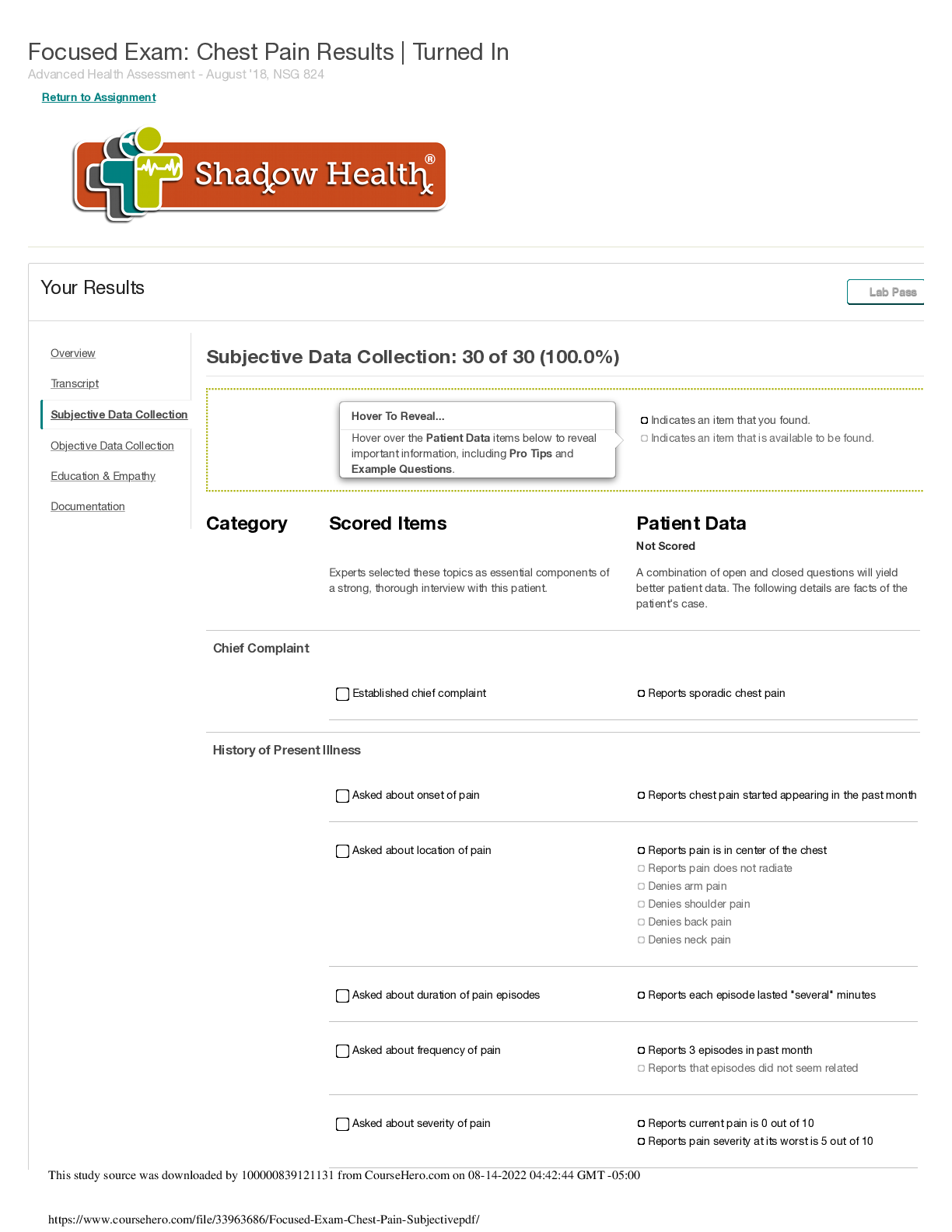
SHADOW HEALTH FOCUSED EXAMS BUNDLE. 100% VERIFIED.
SHADOW HEALTH FOCUSED EXAMS BUNDLE. 100% VERIFIED.
By A+ Solutions 2 years ago
$14.5
59
Reviews( 0 )
Document information
Connected school, study & course
About the document
Uploaded On
Oct 04, 2021
Number of pages
22
Written in
Additional information
This document has been written for:
Uploaded
Oct 04, 2021
Downloads
0
Views
99

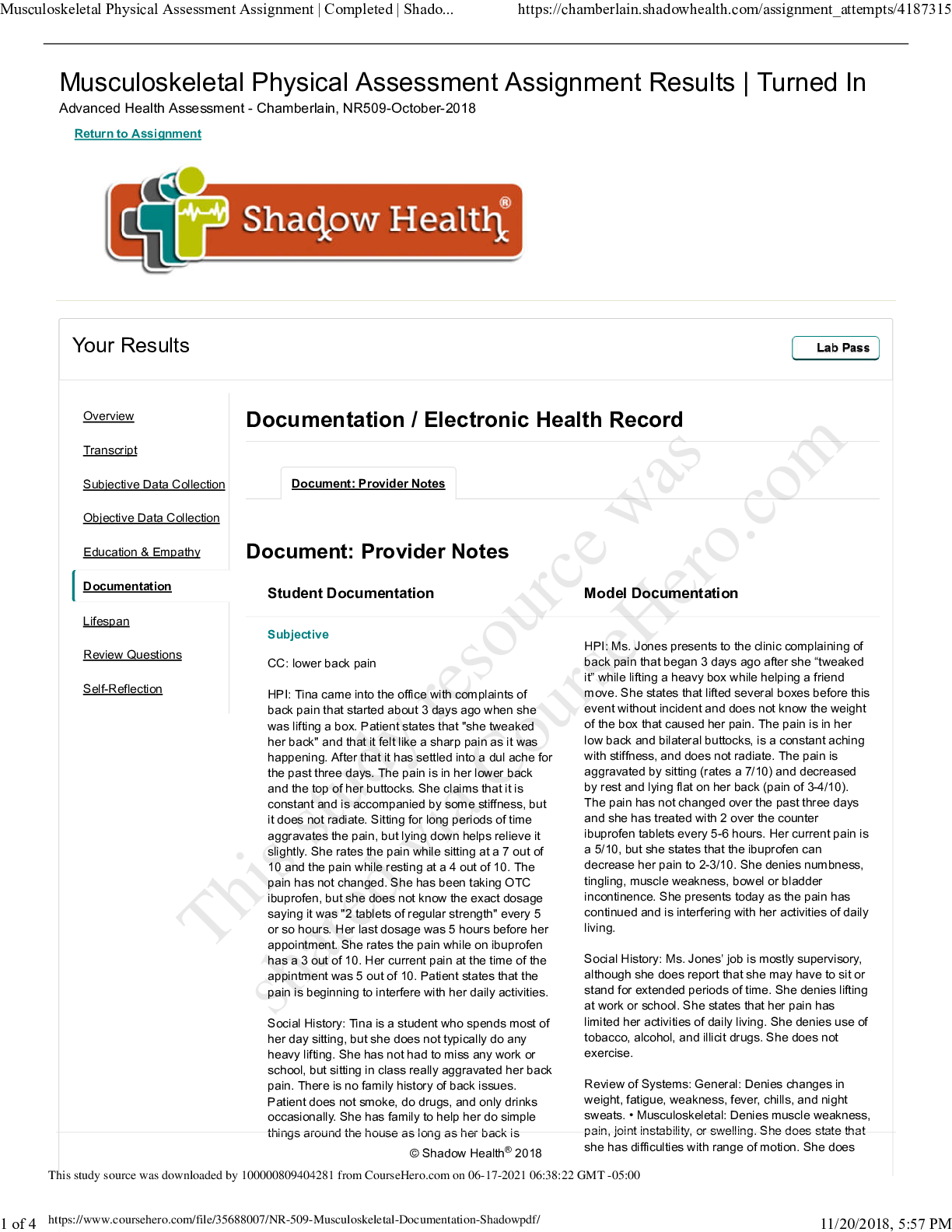
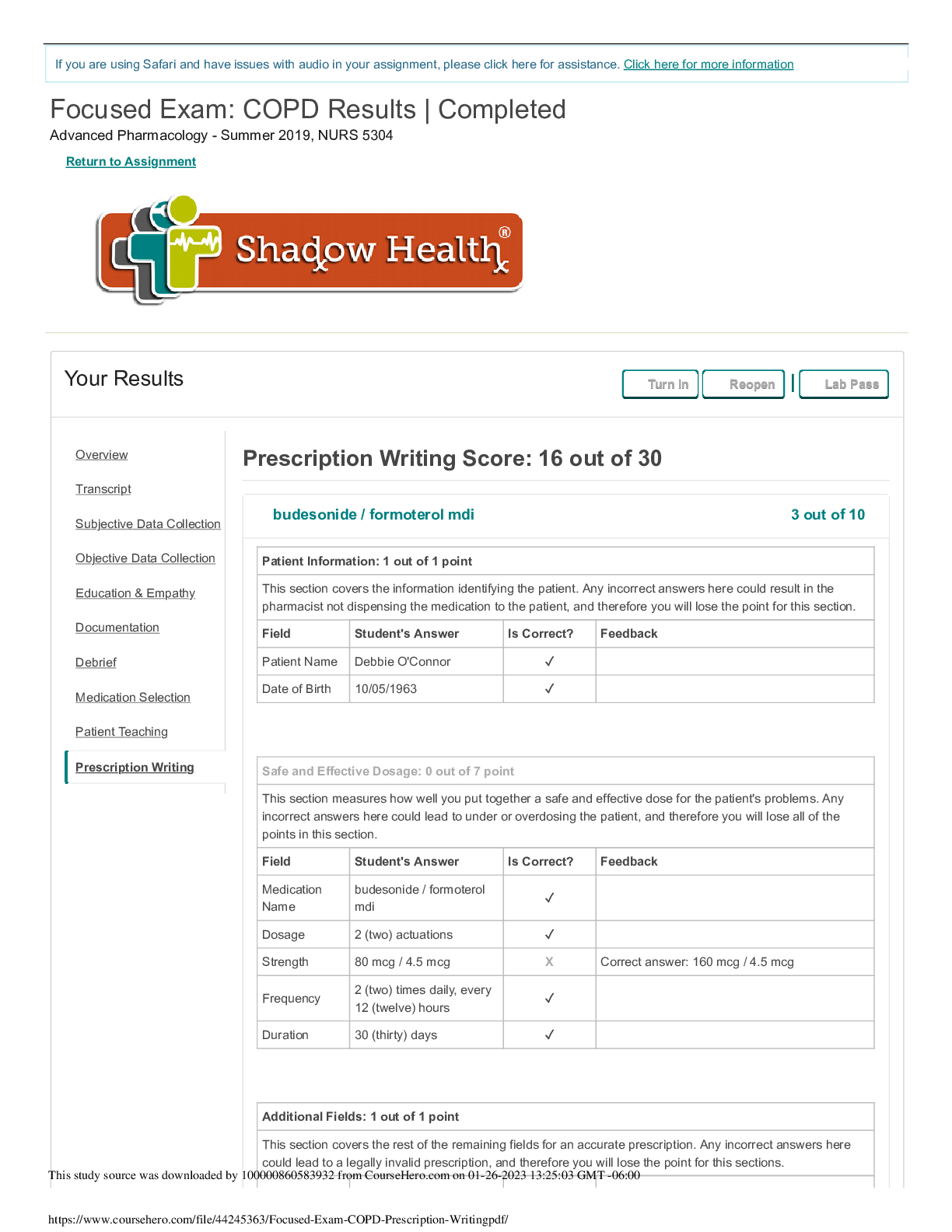
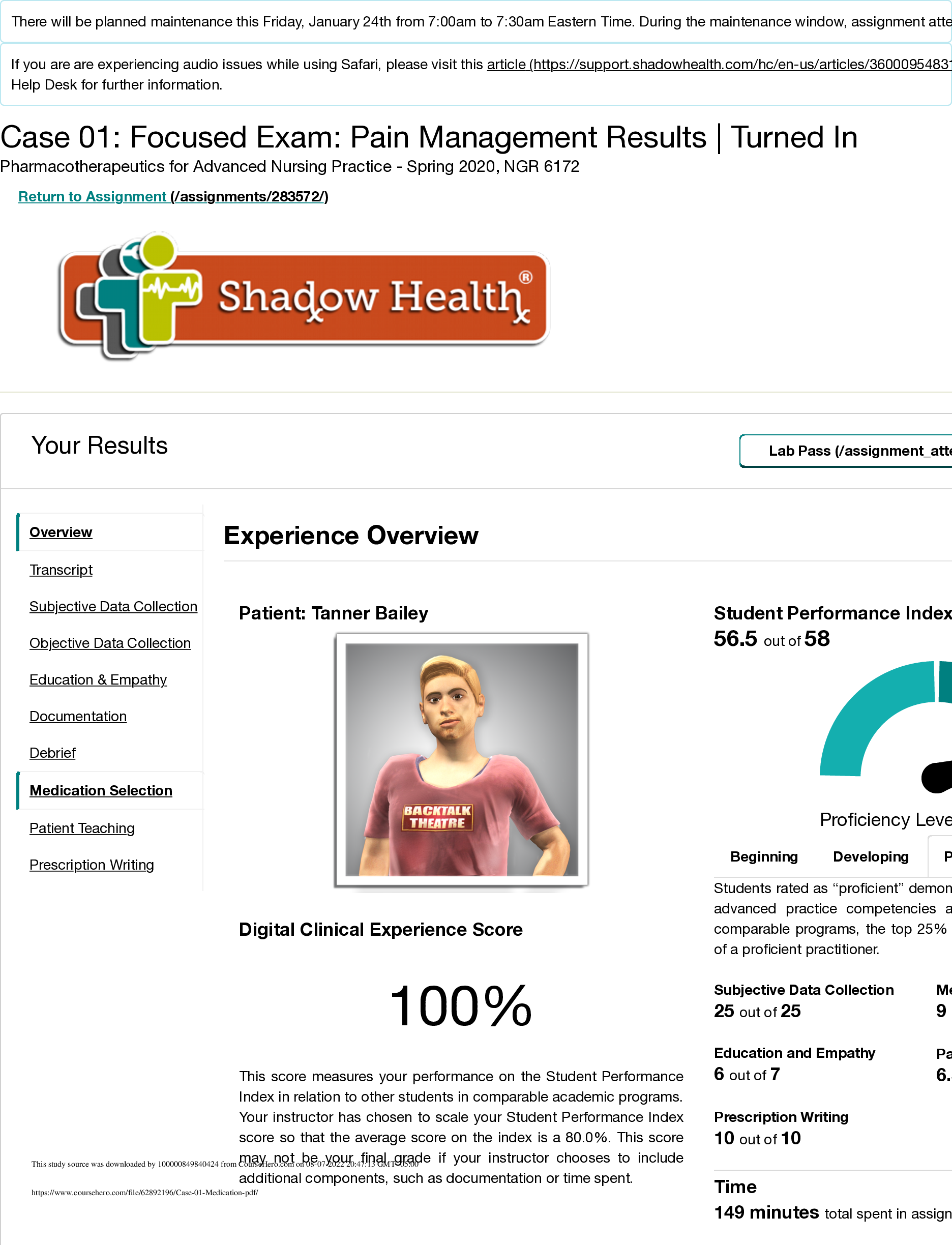
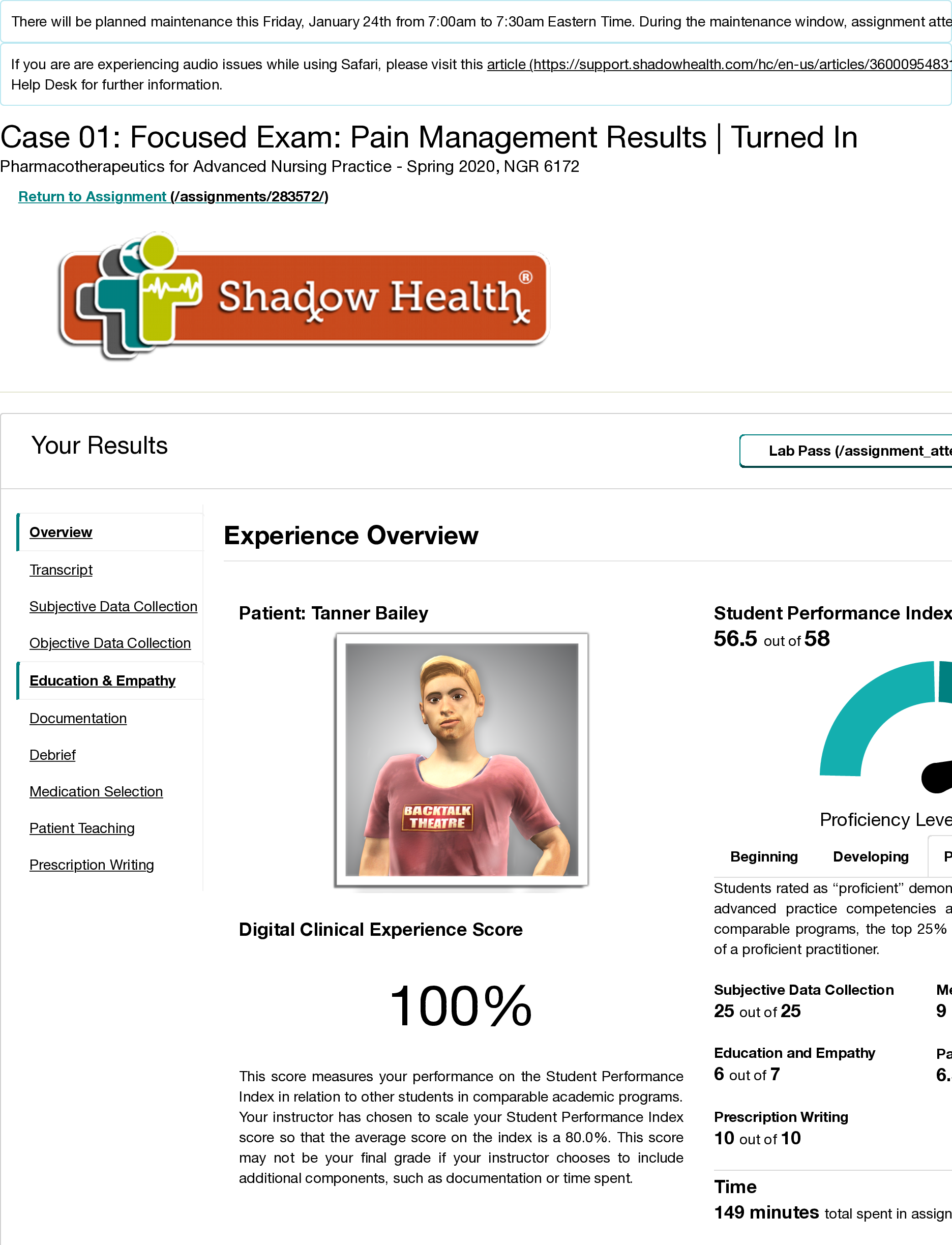
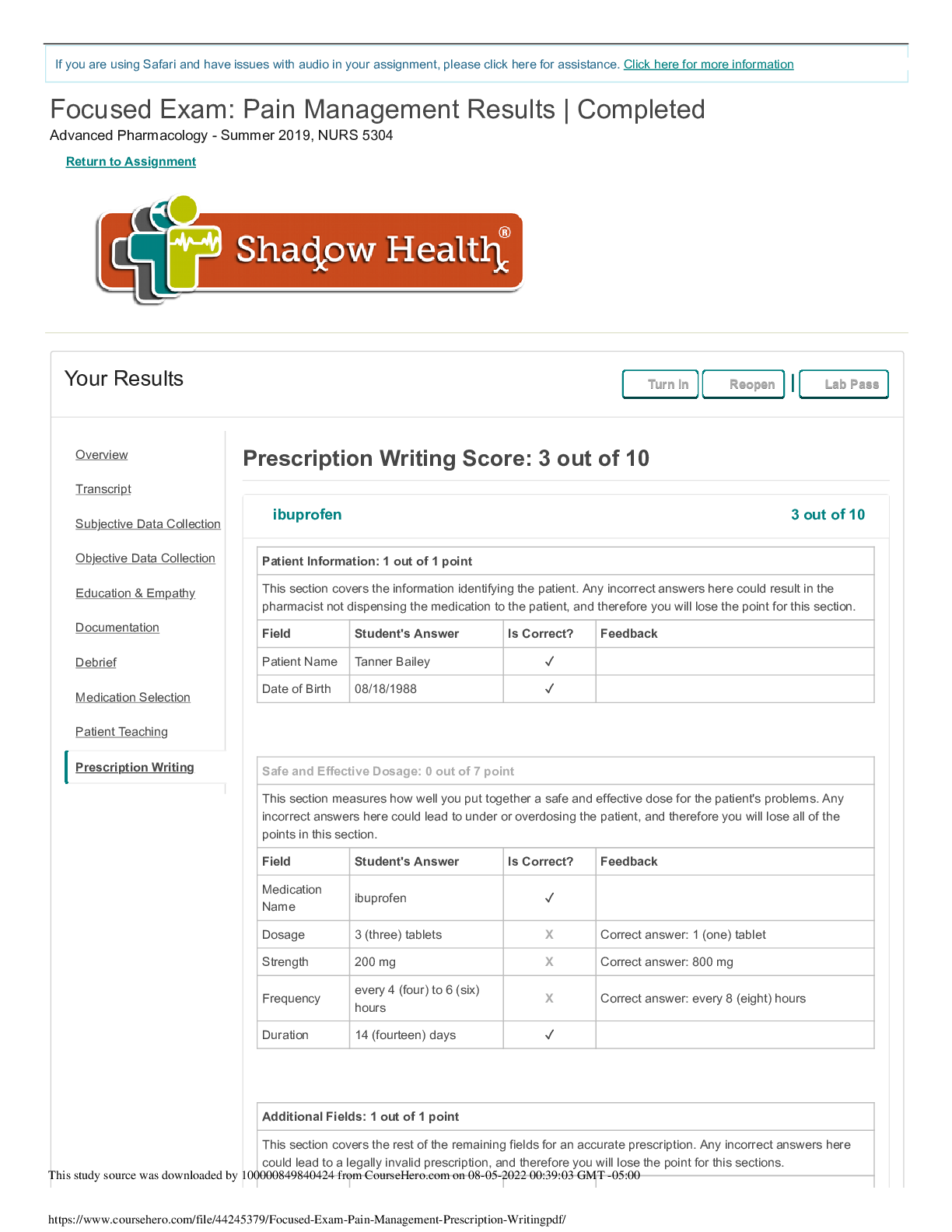
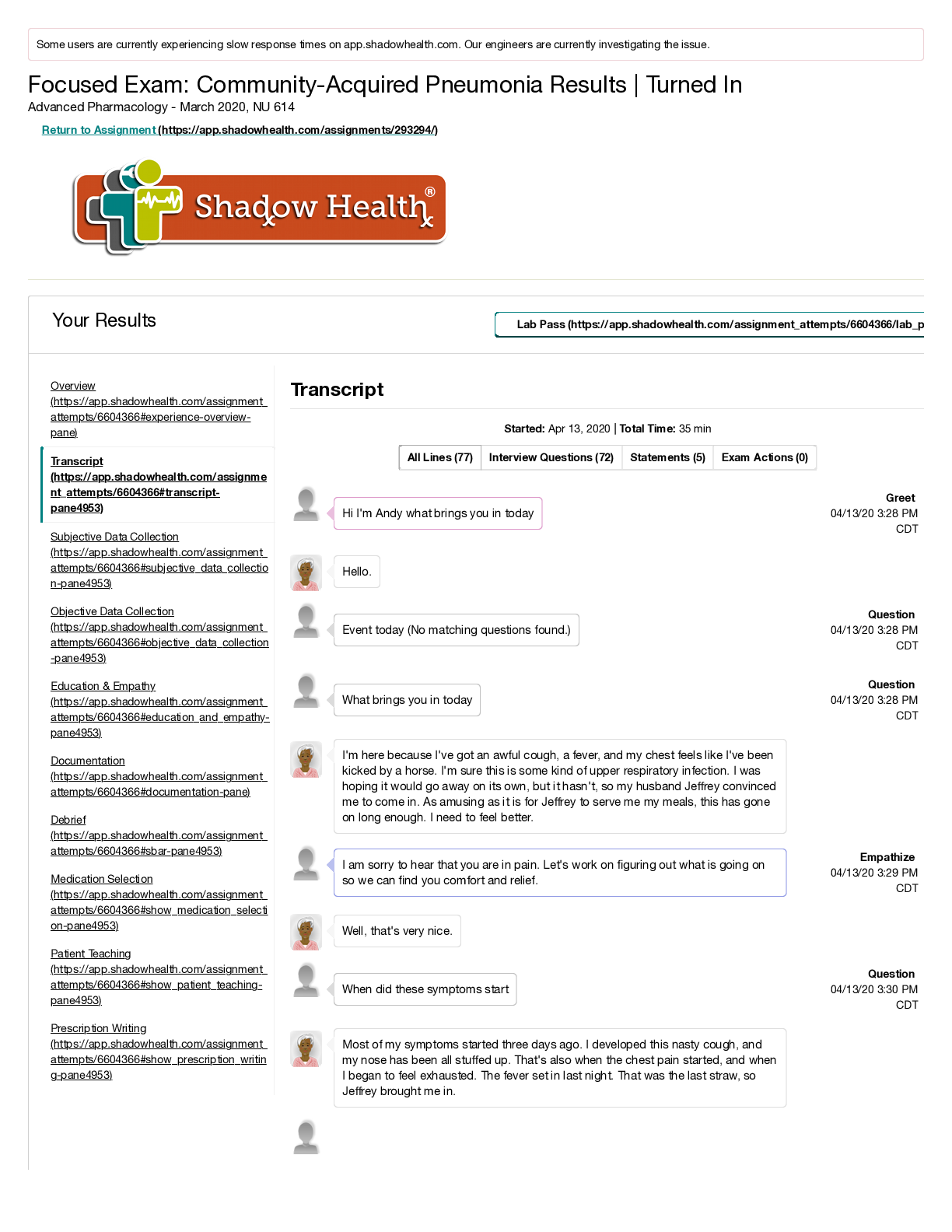
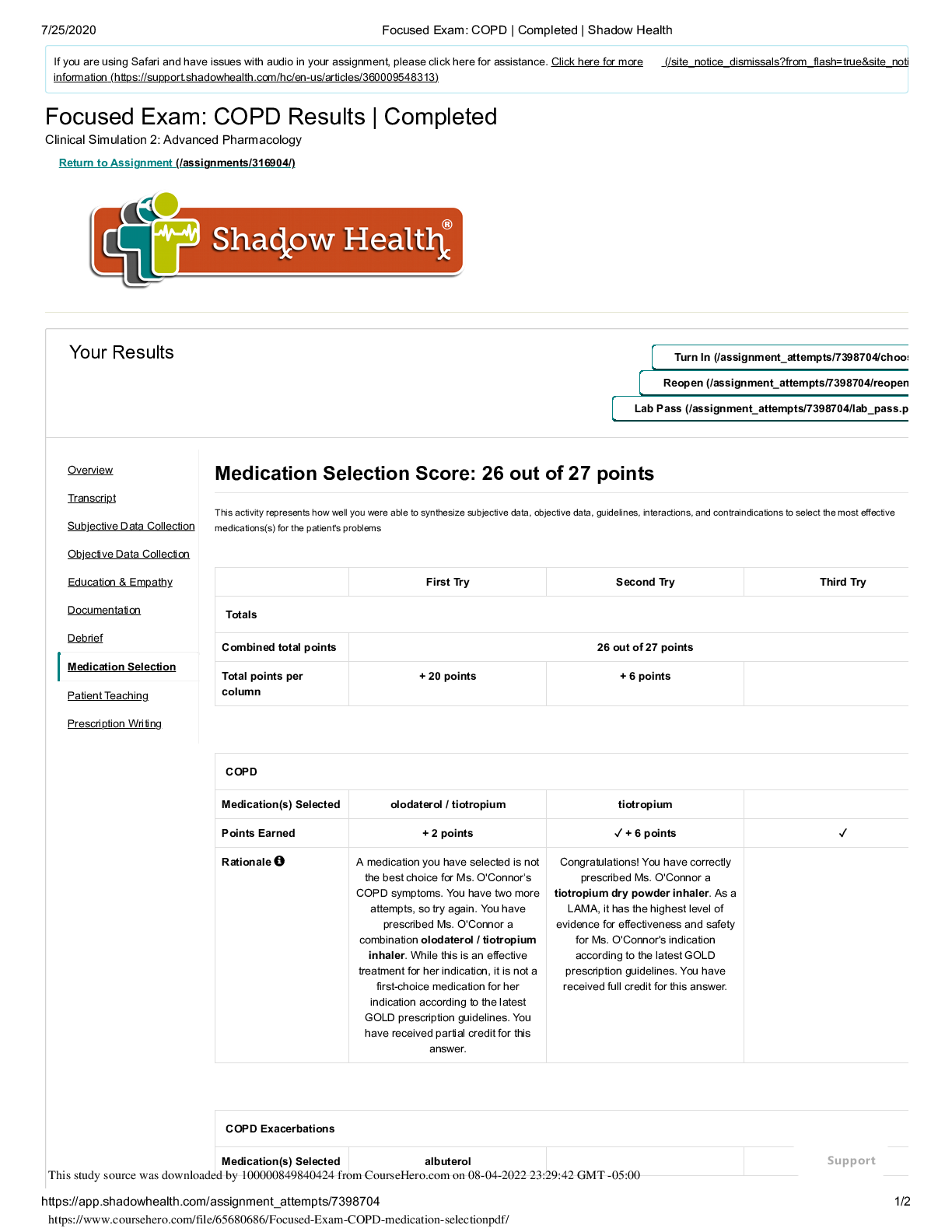
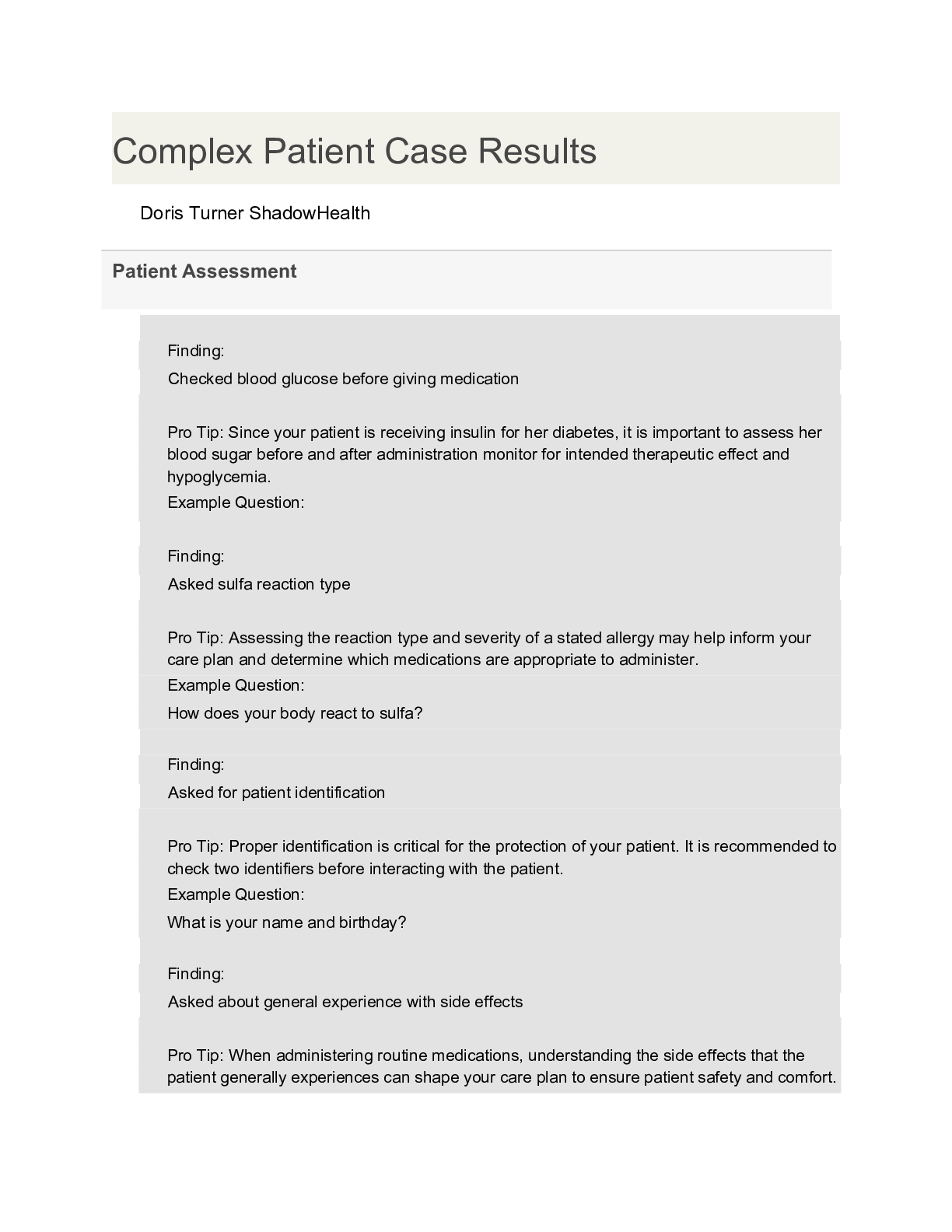

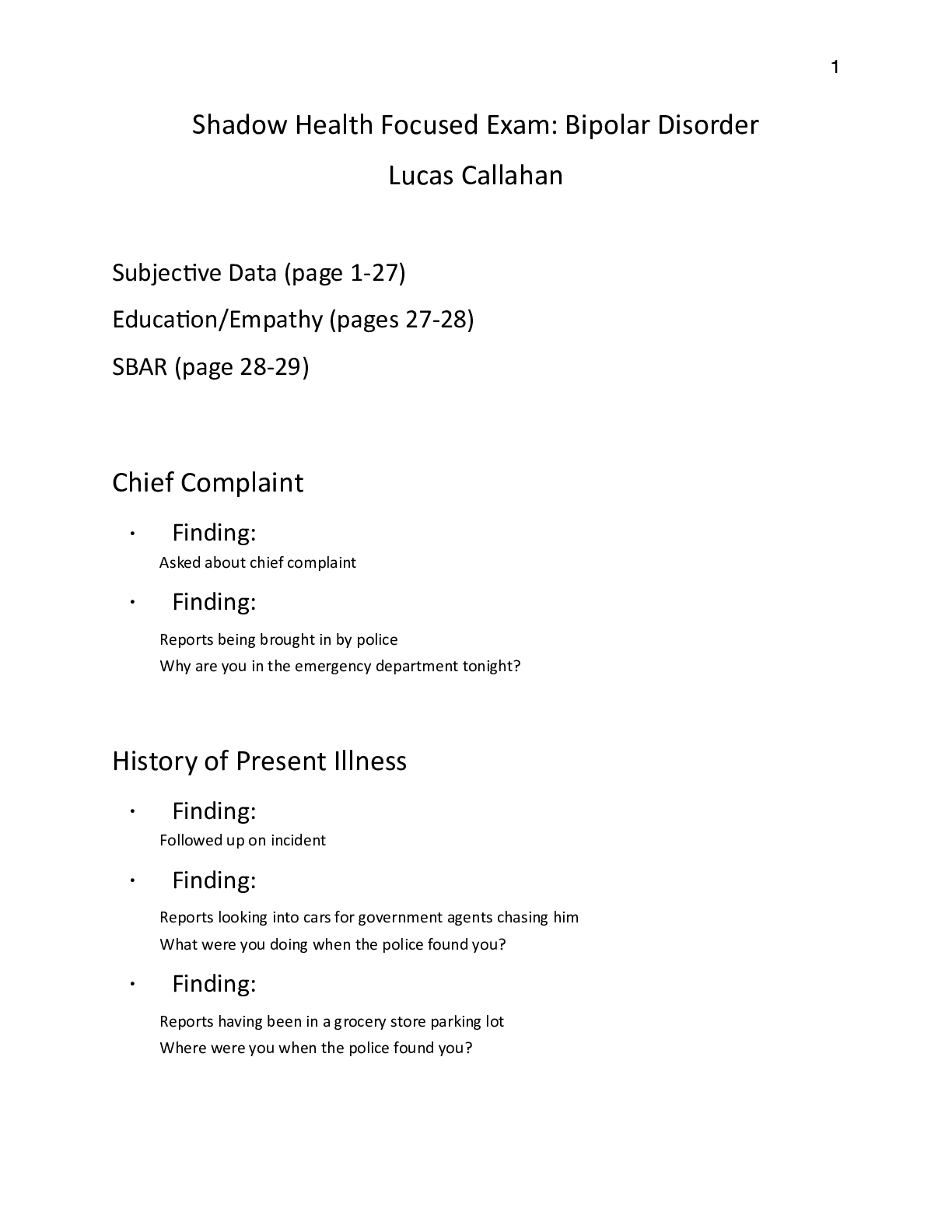
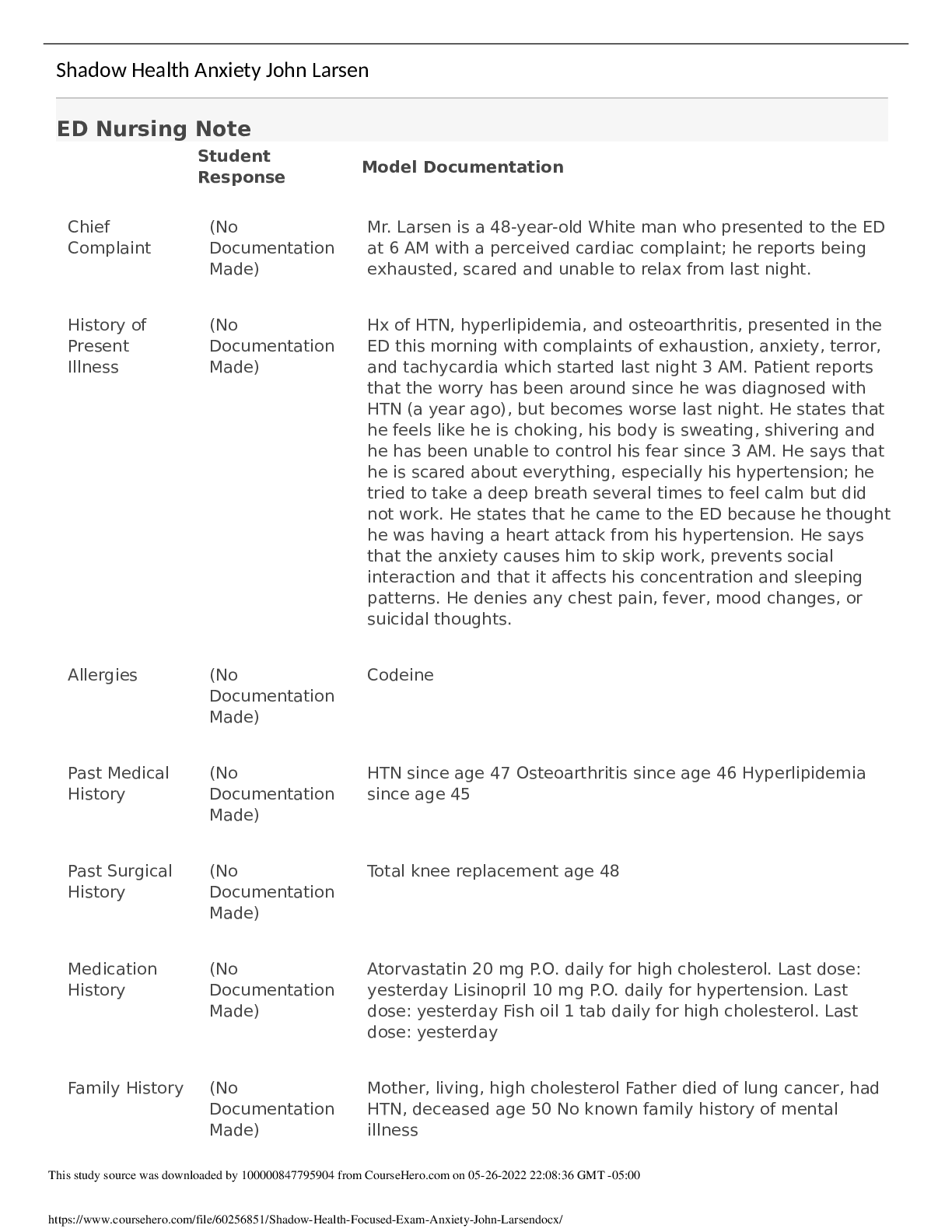
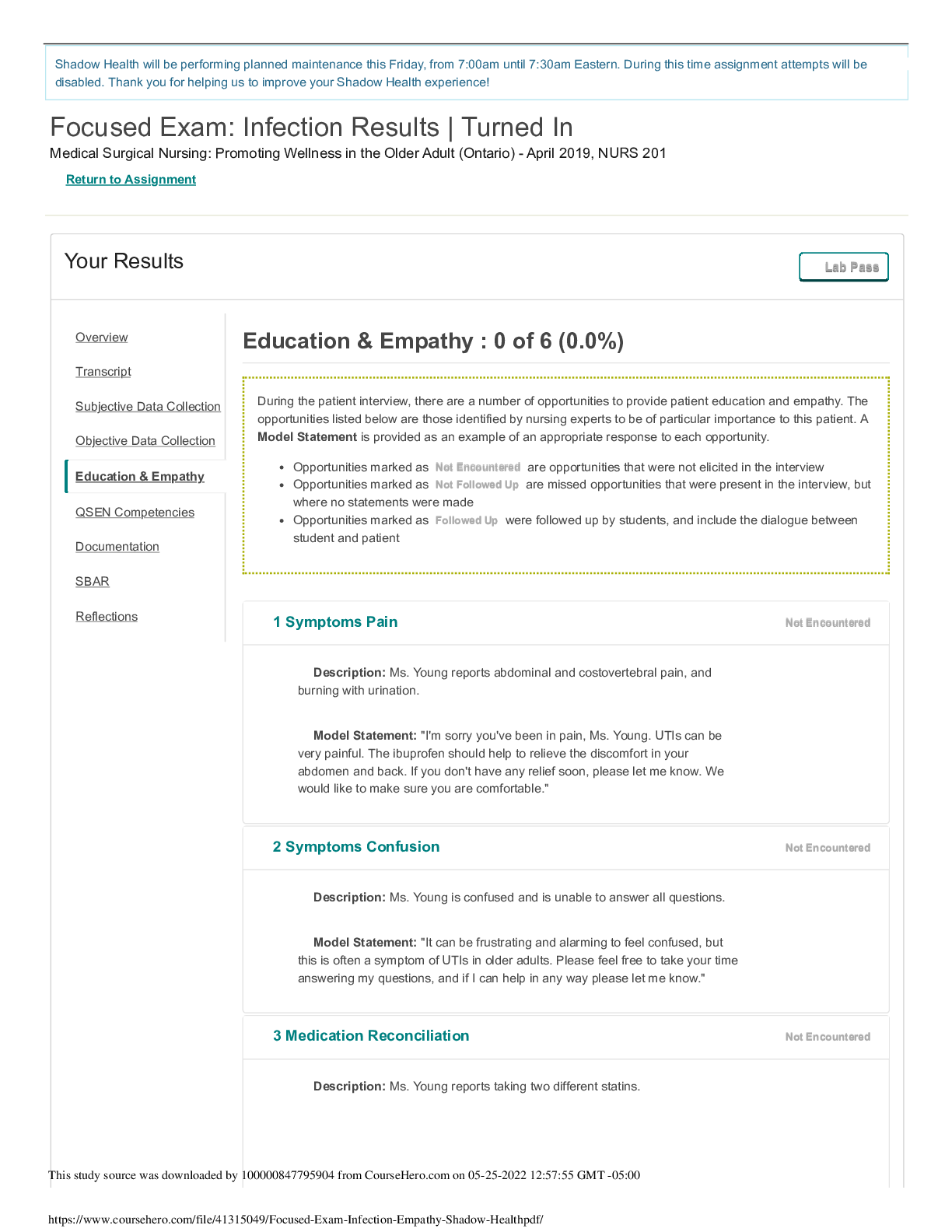
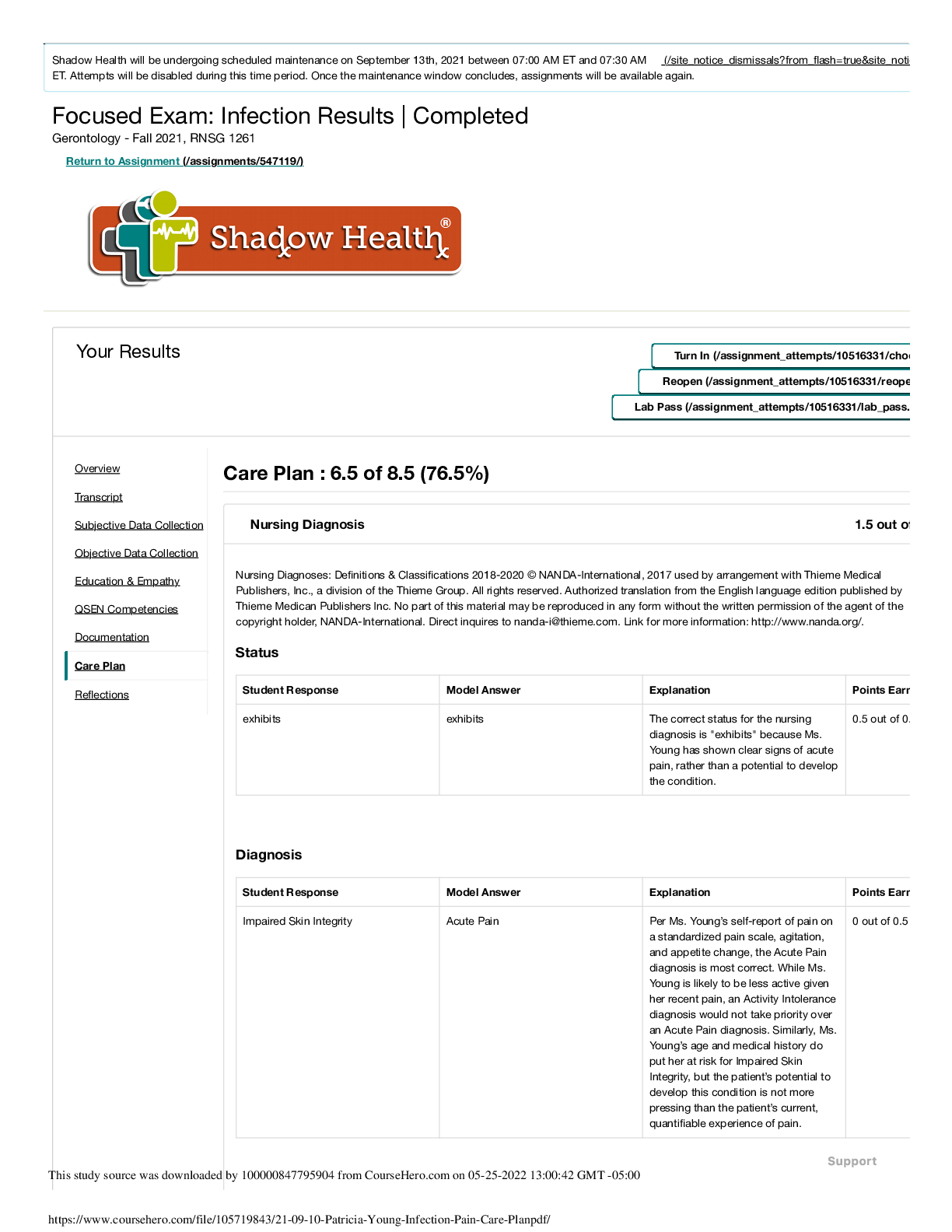
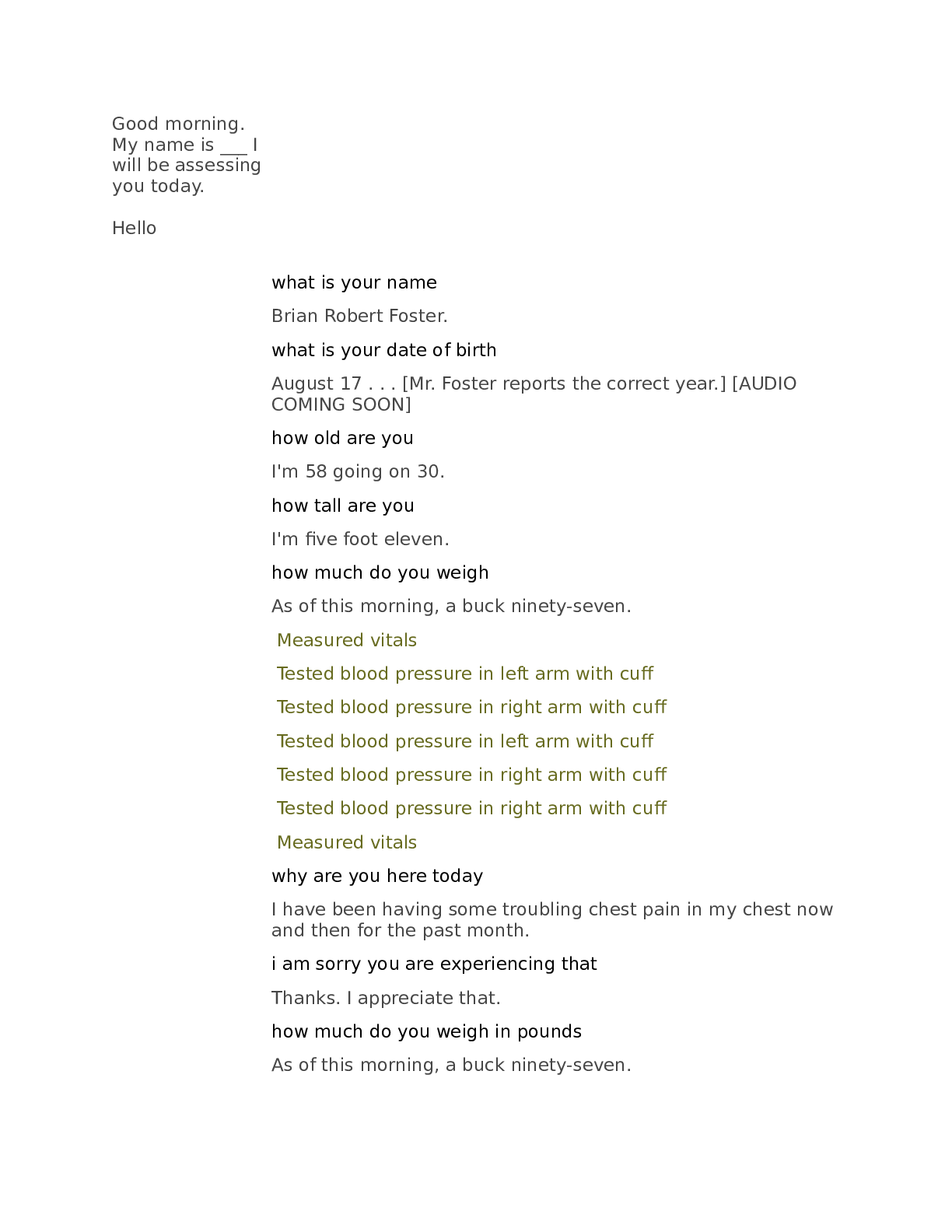
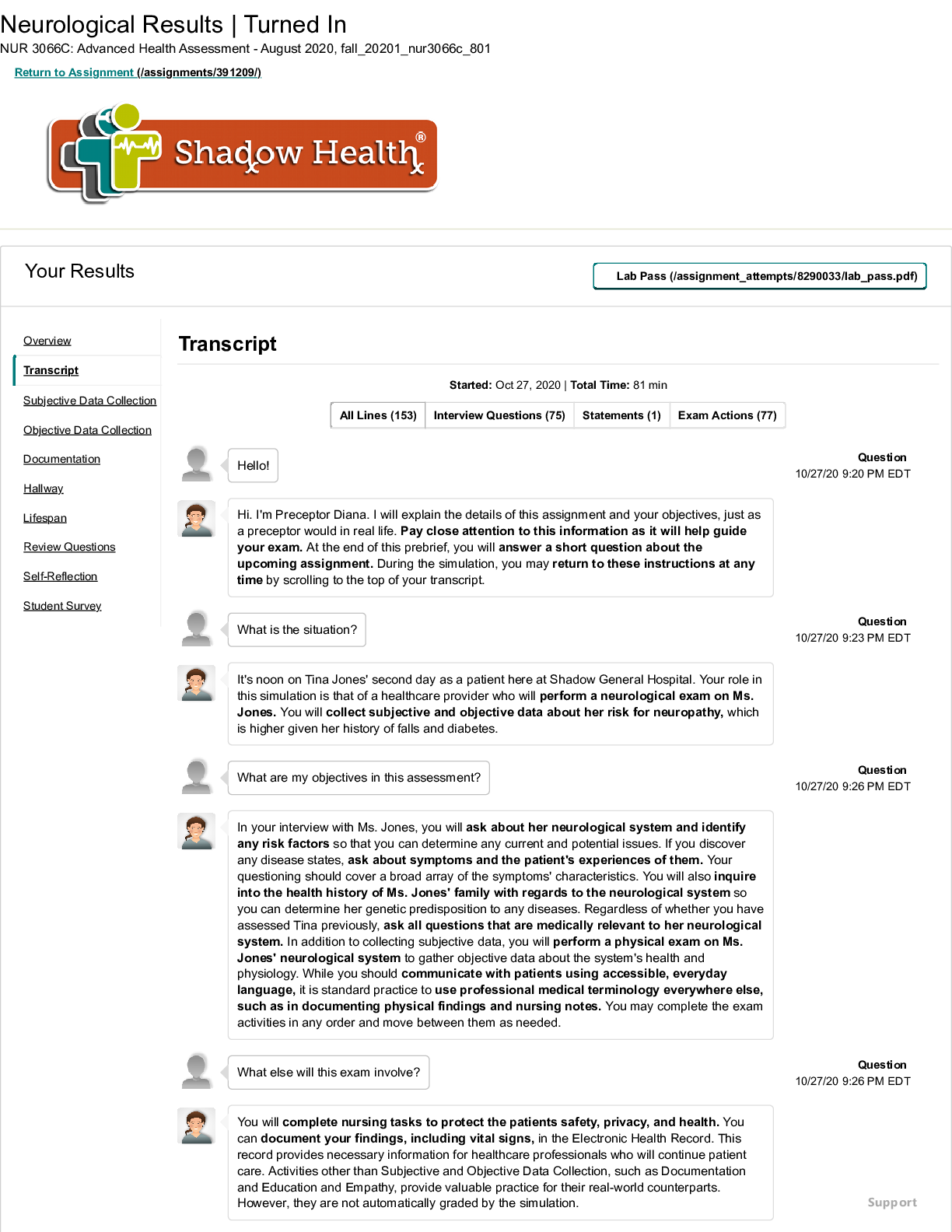
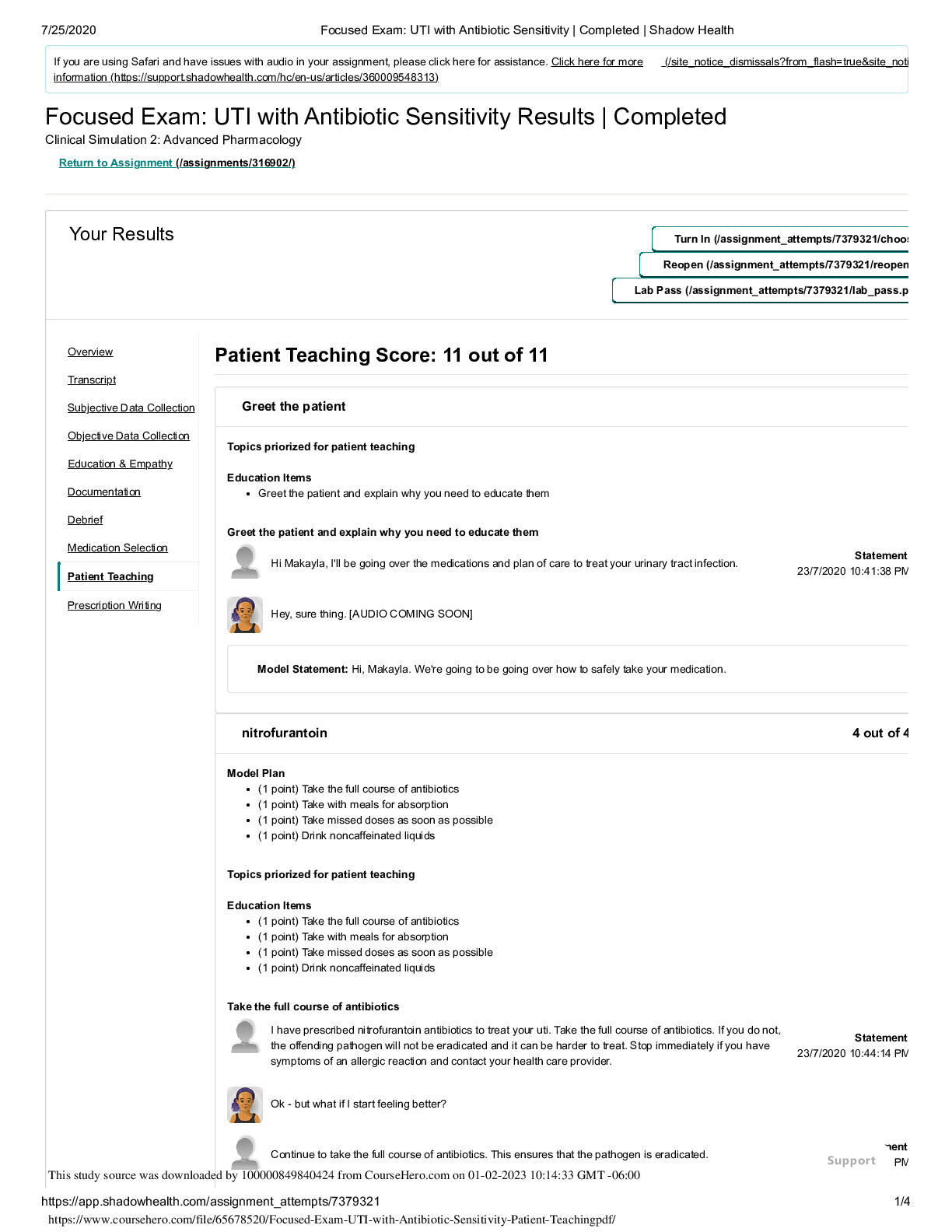

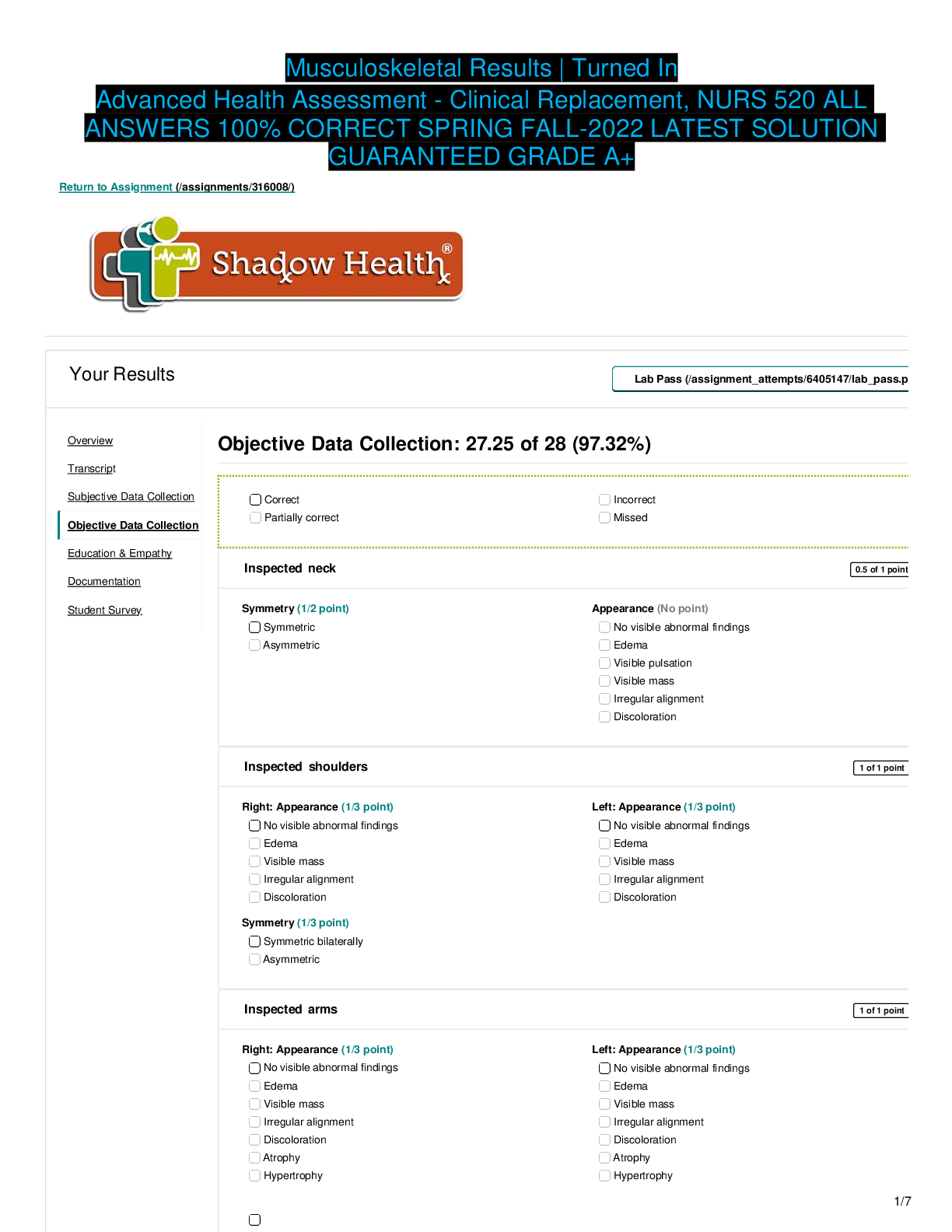
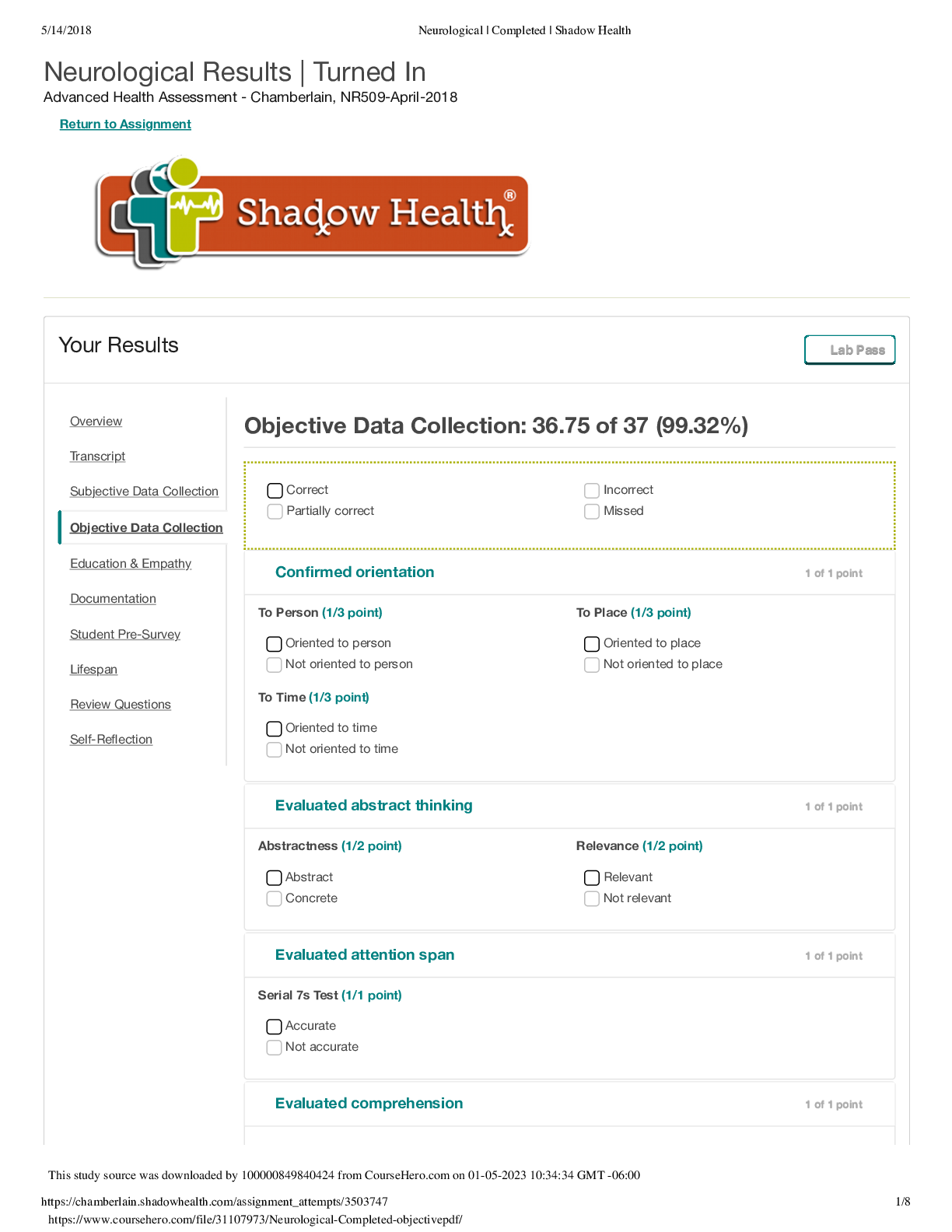
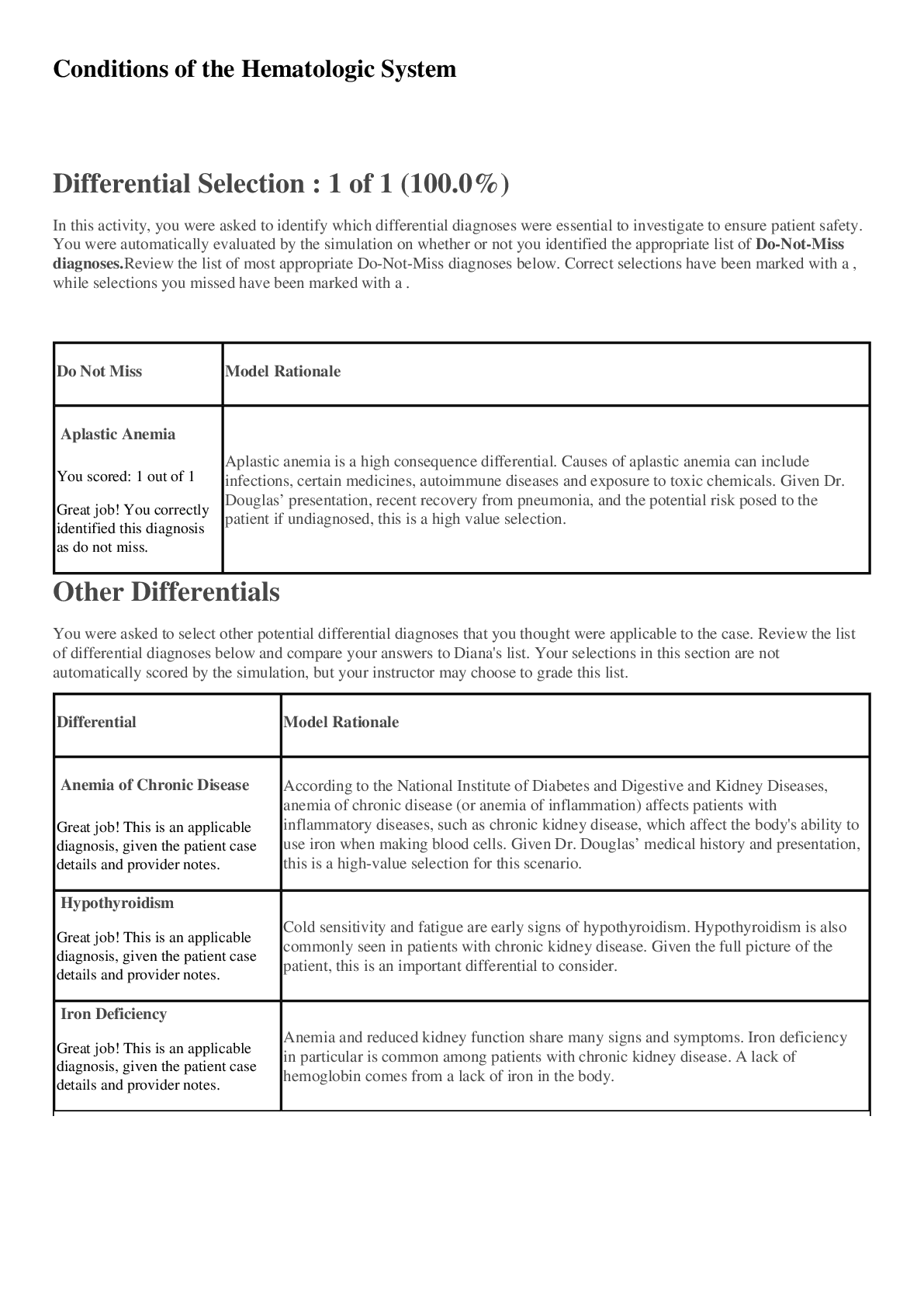
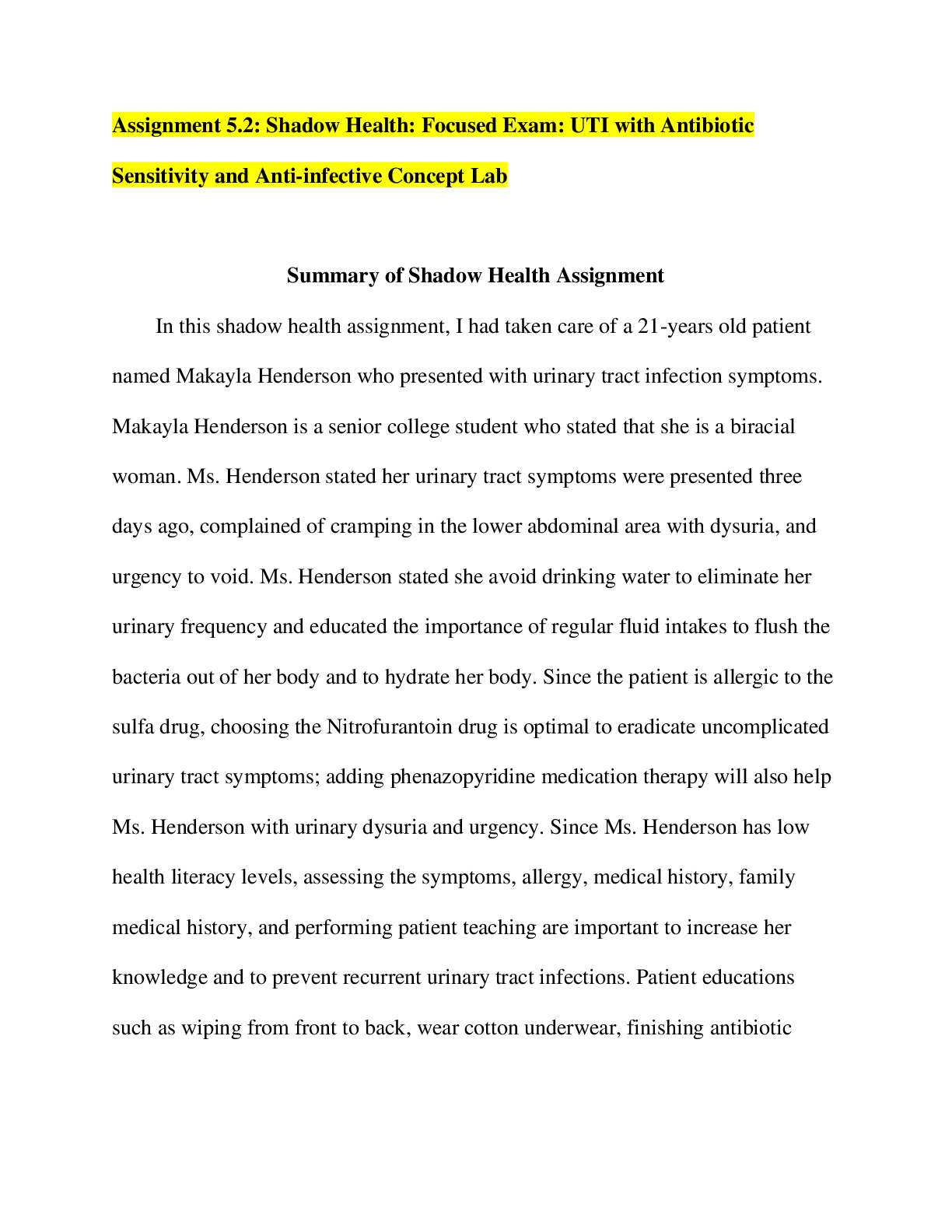
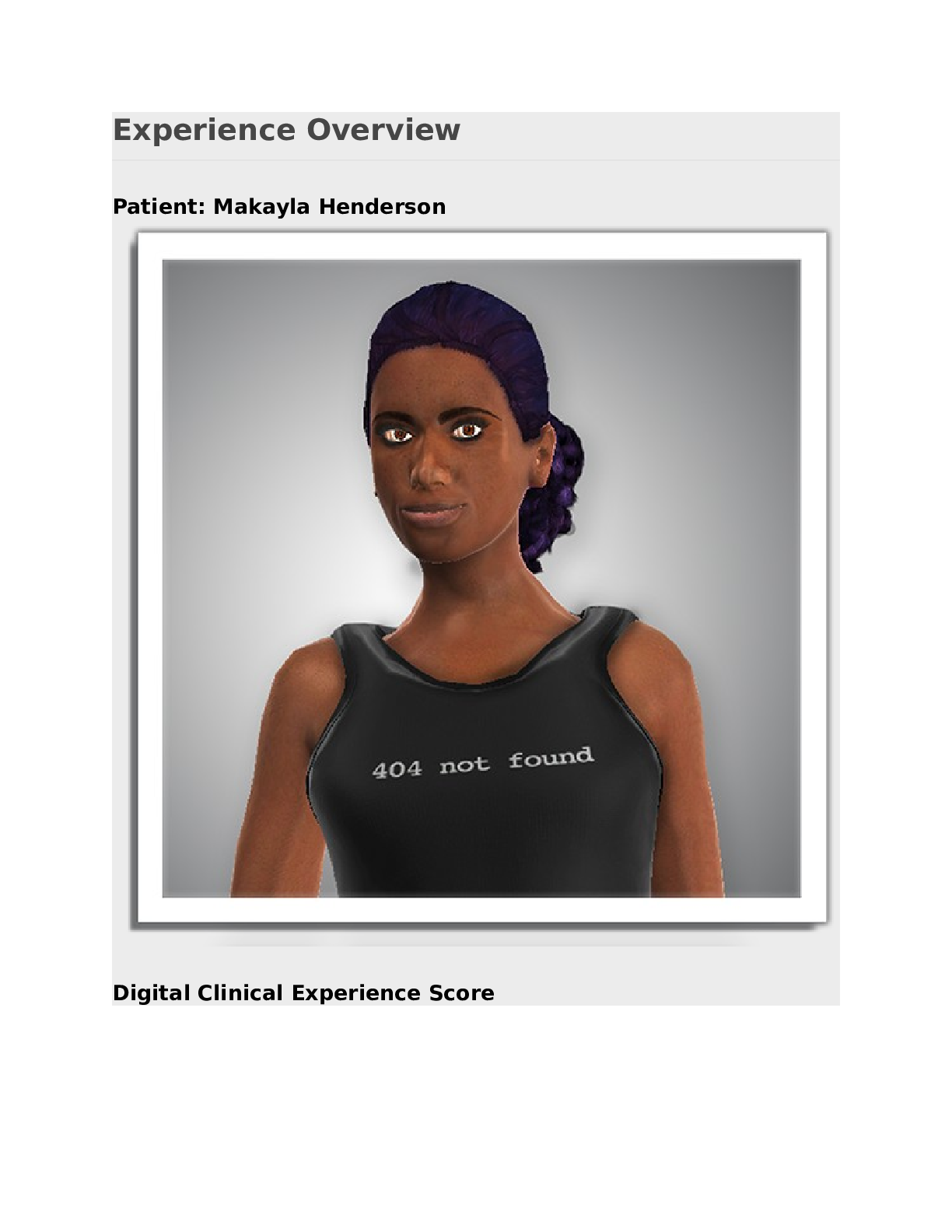
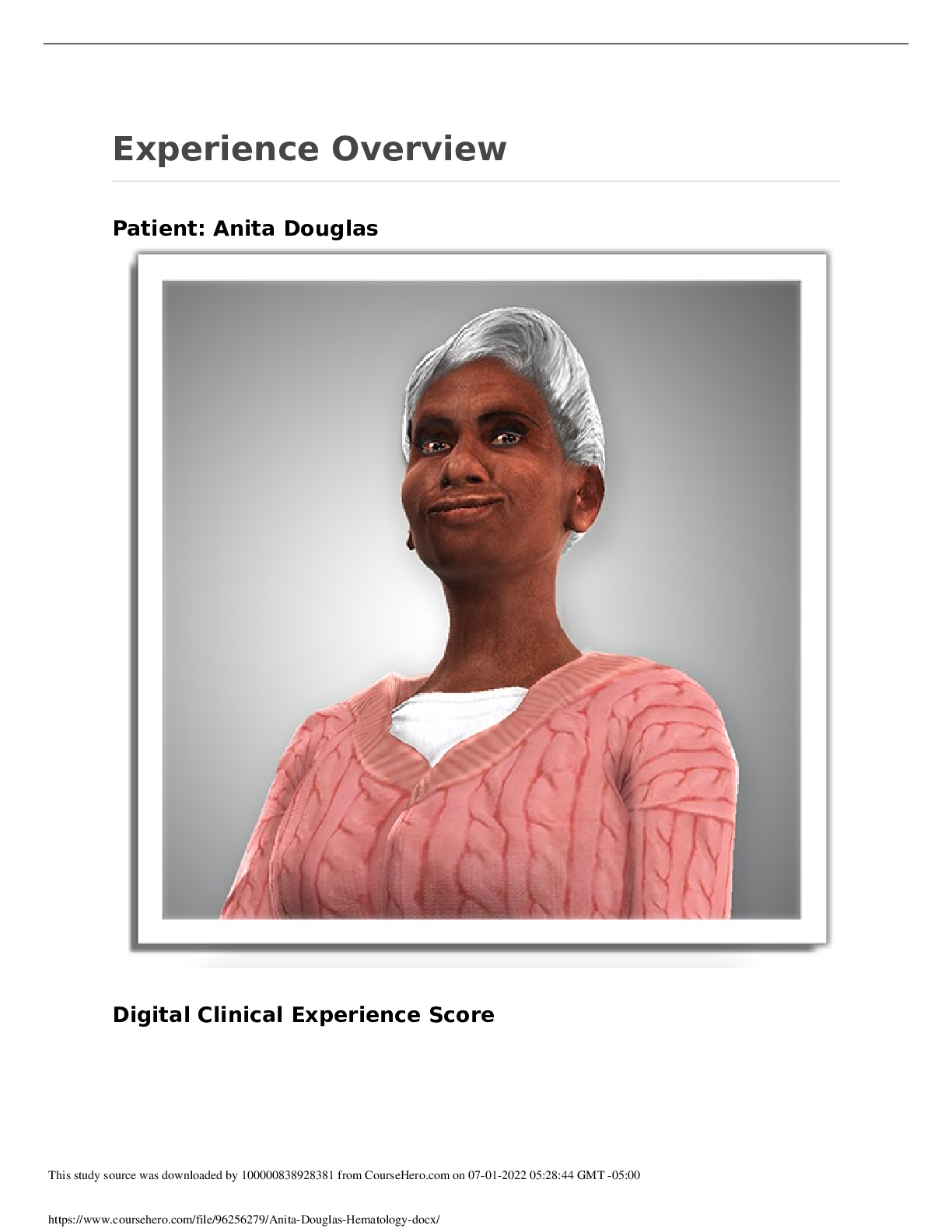
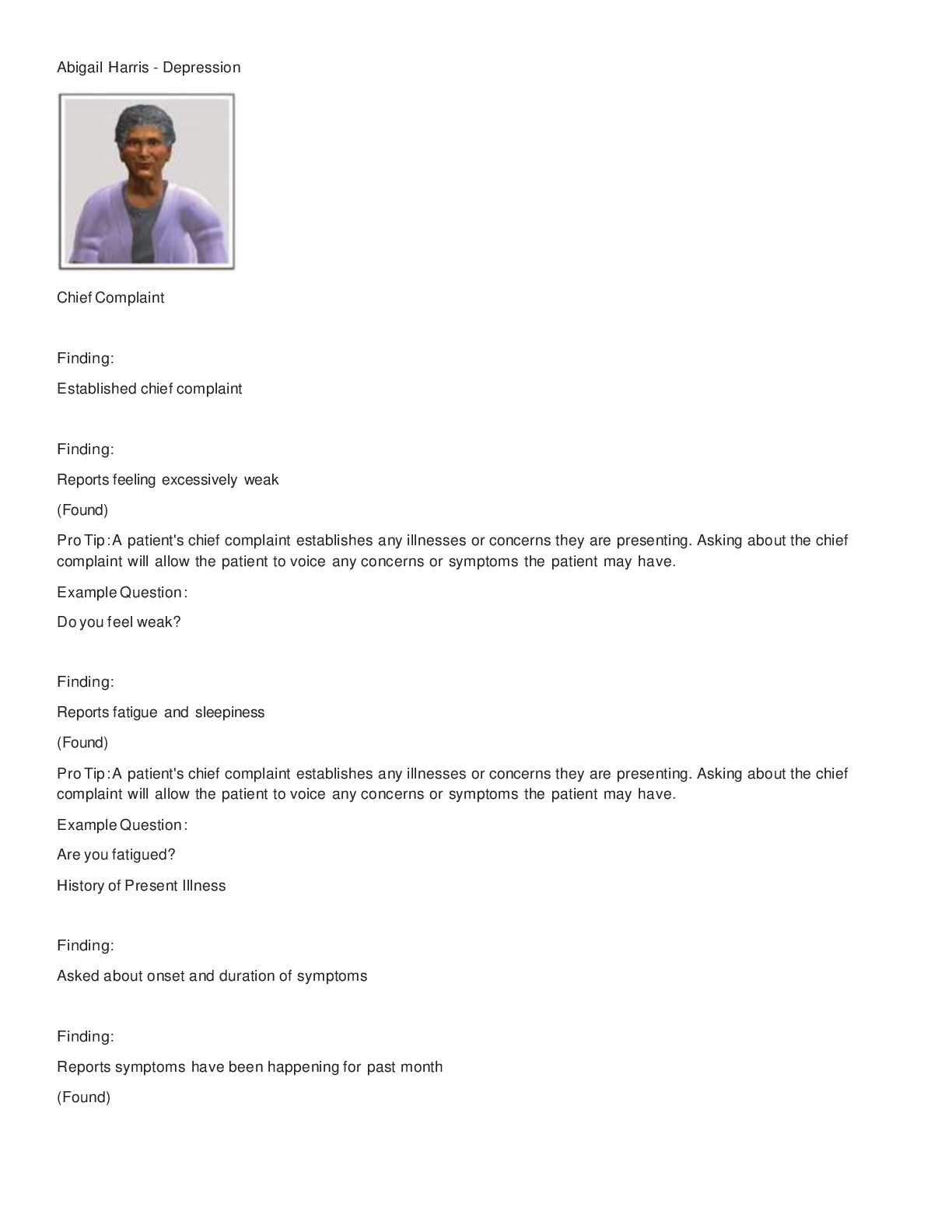
 Transcript.png)

